Business Ethics: Lessons Learnt and Practical Applications
VerifiedAdded on 2023/06/10
|23
|6147
|262
AI Summary
The report aims at reflecting on the different lessons that are learnt through the sessions based on the ethics and the challenges faced by the leaders and subordinates while performing their respective job roles in an organization. Reflection on the ethics has helped in maintaining a cohesive account of the diverse approaches that are utilized by the leaders of the organization.
Contribute Materials
Your contribution can guide someone’s learning journey. Share your
documents today.
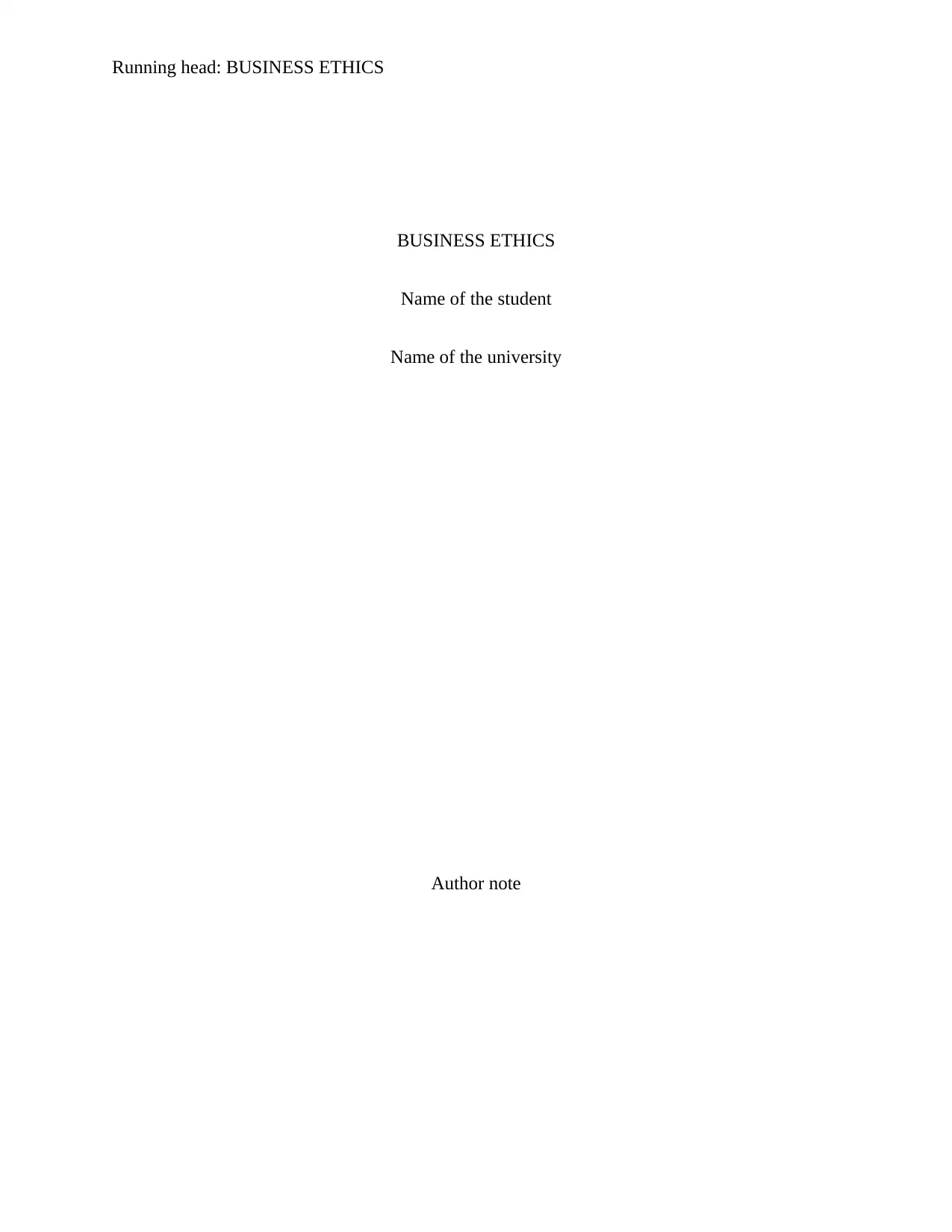
Running head: BUSINESS ETHICS
BUSINESS ETHICS
Name of the student
Name of the university
Author note
BUSINESS ETHICS
Name of the student
Name of the university
Author note
Secure Best Marks with AI Grader
Need help grading? Try our AI Grader for instant feedback on your assignments.
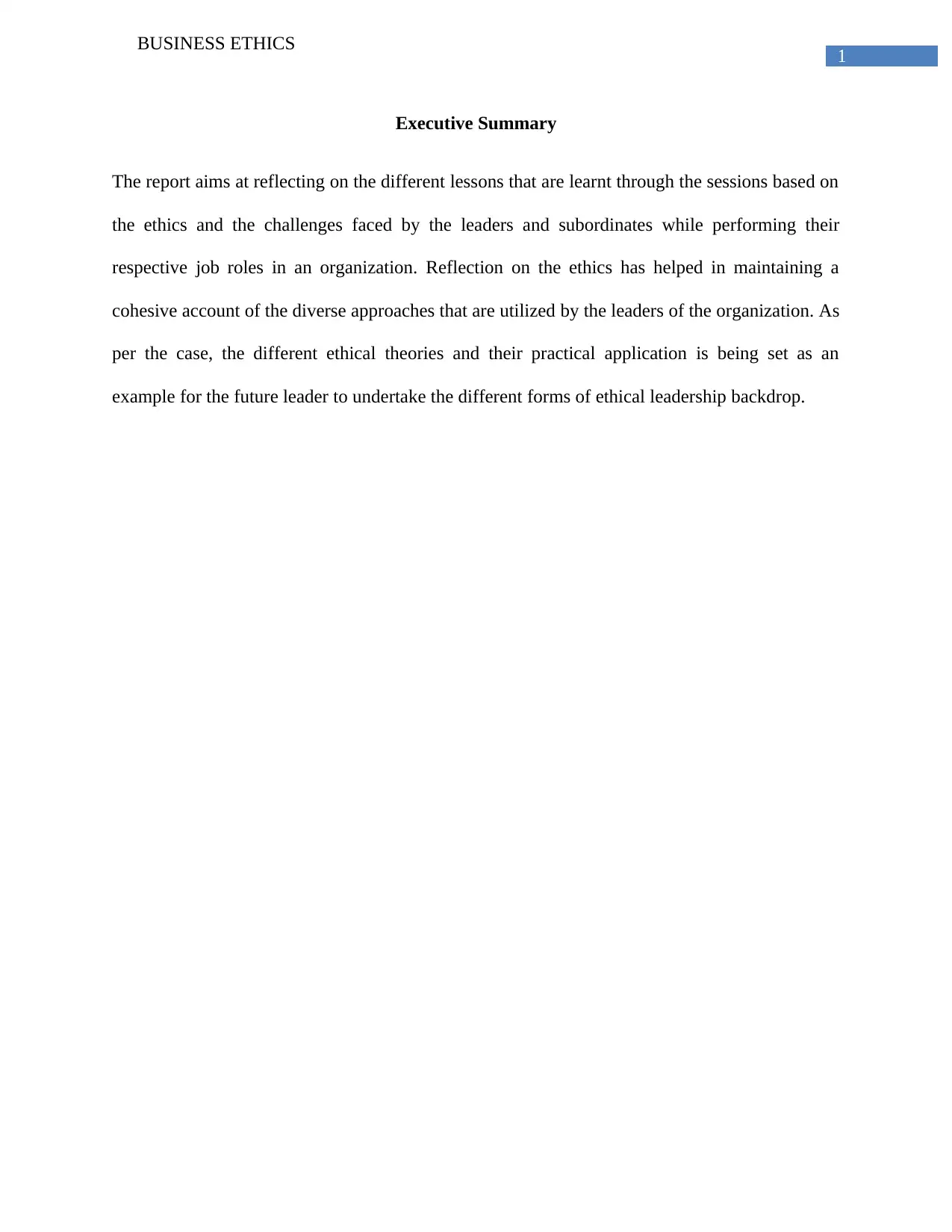
1
BUSINESS ETHICS
Executive Summary
The report aims at reflecting on the different lessons that are learnt through the sessions based on
the ethics and the challenges faced by the leaders and subordinates while performing their
respective job roles in an organization. Reflection on the ethics has helped in maintaining a
cohesive account of the diverse approaches that are utilized by the leaders of the organization. As
per the case, the different ethical theories and their practical application is being set as an
example for the future leader to undertake the different forms of ethical leadership backdrop.
BUSINESS ETHICS
Executive Summary
The report aims at reflecting on the different lessons that are learnt through the sessions based on
the ethics and the challenges faced by the leaders and subordinates while performing their
respective job roles in an organization. Reflection on the ethics has helped in maintaining a
cohesive account of the diverse approaches that are utilized by the leaders of the organization. As
per the case, the different ethical theories and their practical application is being set as an
example for the future leader to undertake the different forms of ethical leadership backdrop.
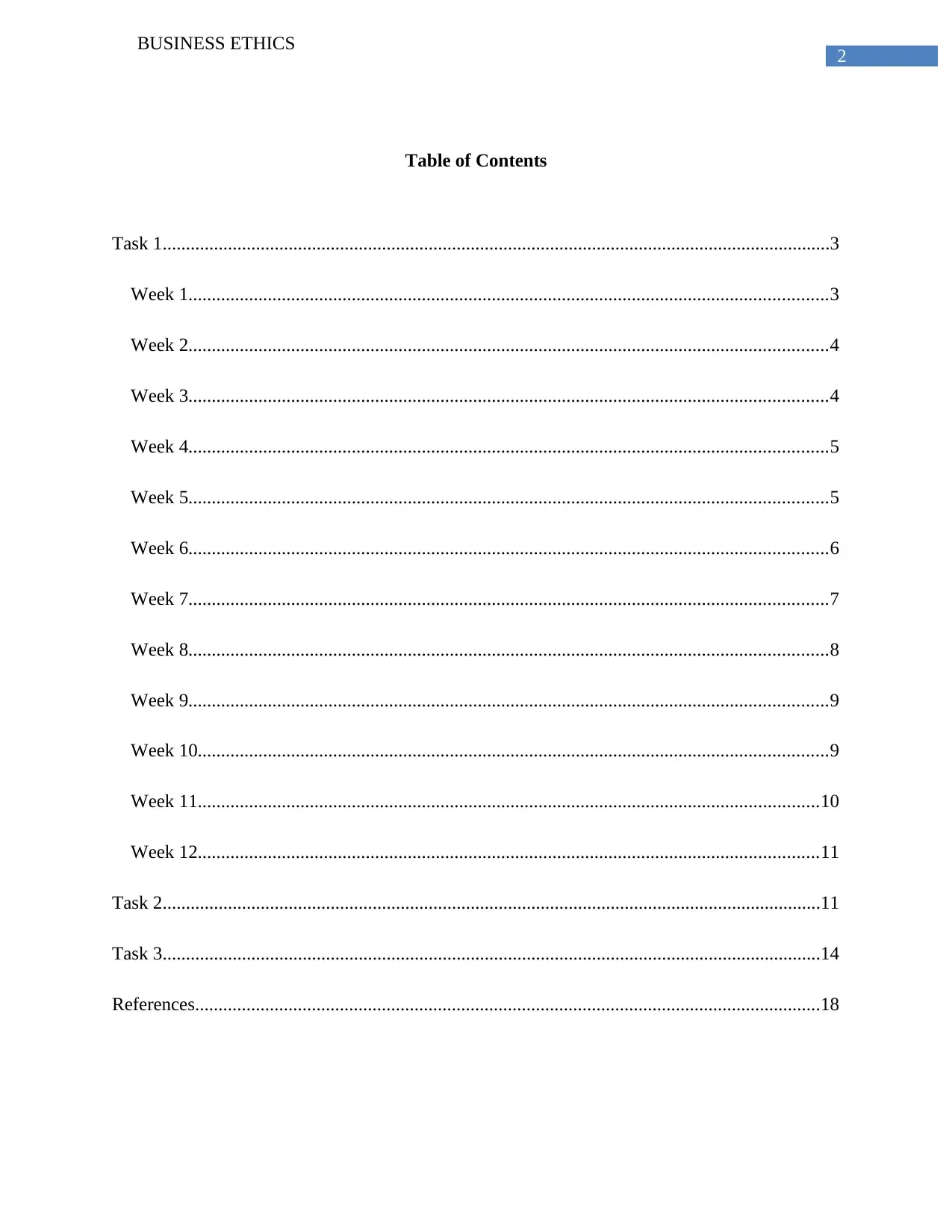
2
BUSINESS ETHICS
Table of Contents
Task 1...............................................................................................................................................3
Week 1.........................................................................................................................................3
Week 2.........................................................................................................................................4
Week 3.........................................................................................................................................4
Week 4.........................................................................................................................................5
Week 5.........................................................................................................................................5
Week 6.........................................................................................................................................6
Week 7.........................................................................................................................................7
Week 8.........................................................................................................................................8
Week 9.........................................................................................................................................9
Week 10.......................................................................................................................................9
Week 11.....................................................................................................................................10
Week 12.....................................................................................................................................11
Task 2.............................................................................................................................................11
Task 3.............................................................................................................................................14
References......................................................................................................................................18
BUSINESS ETHICS
Table of Contents
Task 1...............................................................................................................................................3
Week 1.........................................................................................................................................3
Week 2.........................................................................................................................................4
Week 3.........................................................................................................................................4
Week 4.........................................................................................................................................5
Week 5.........................................................................................................................................5
Week 6.........................................................................................................................................6
Week 7.........................................................................................................................................7
Week 8.........................................................................................................................................8
Week 9.........................................................................................................................................9
Week 10.......................................................................................................................................9
Week 11.....................................................................................................................................10
Week 12.....................................................................................................................................11
Task 2.............................................................................................................................................11
Task 3.............................................................................................................................................14
References......................................................................................................................................18
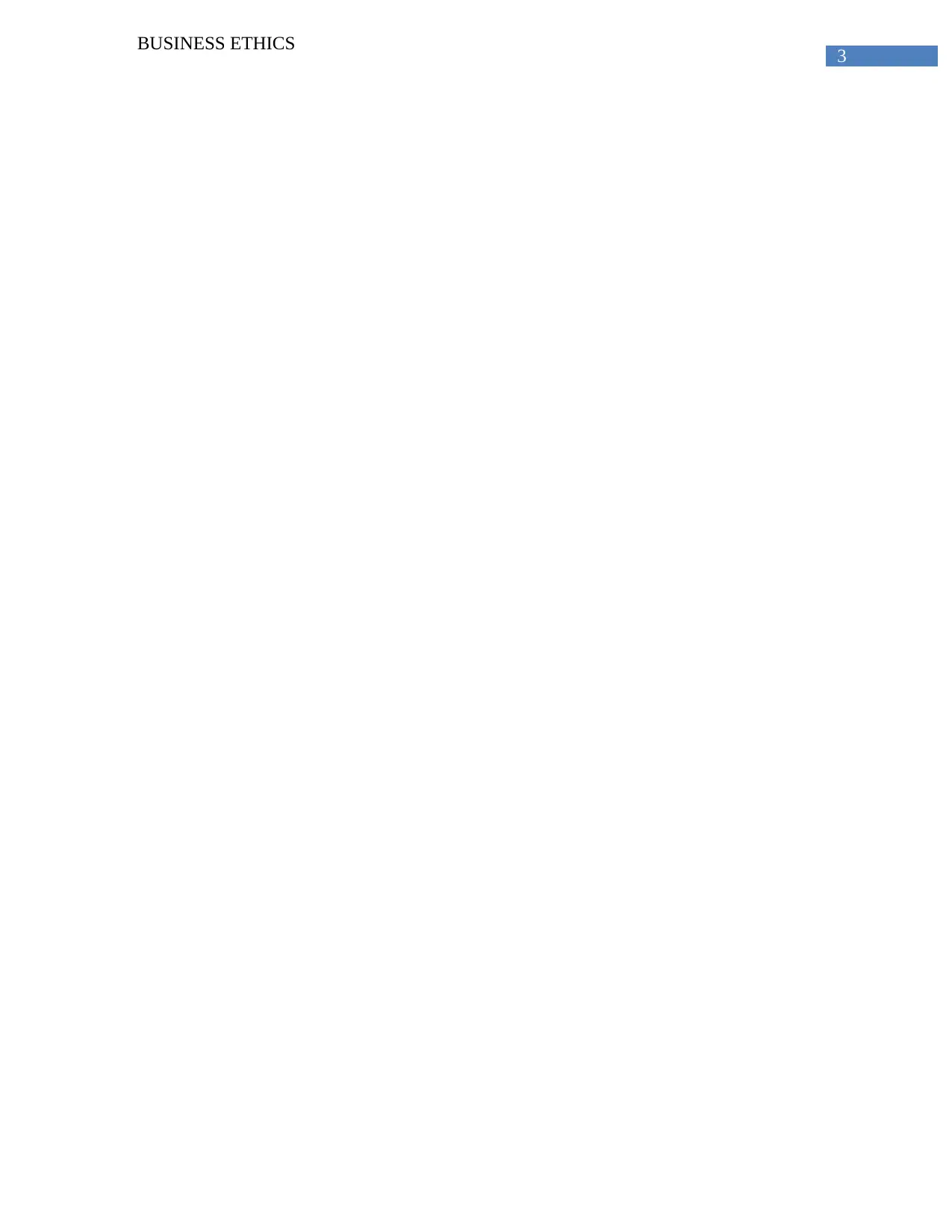
3
BUSINESS ETHICS
BUSINESS ETHICS
Secure Best Marks with AI Grader
Need help grading? Try our AI Grader for instant feedback on your assignments.
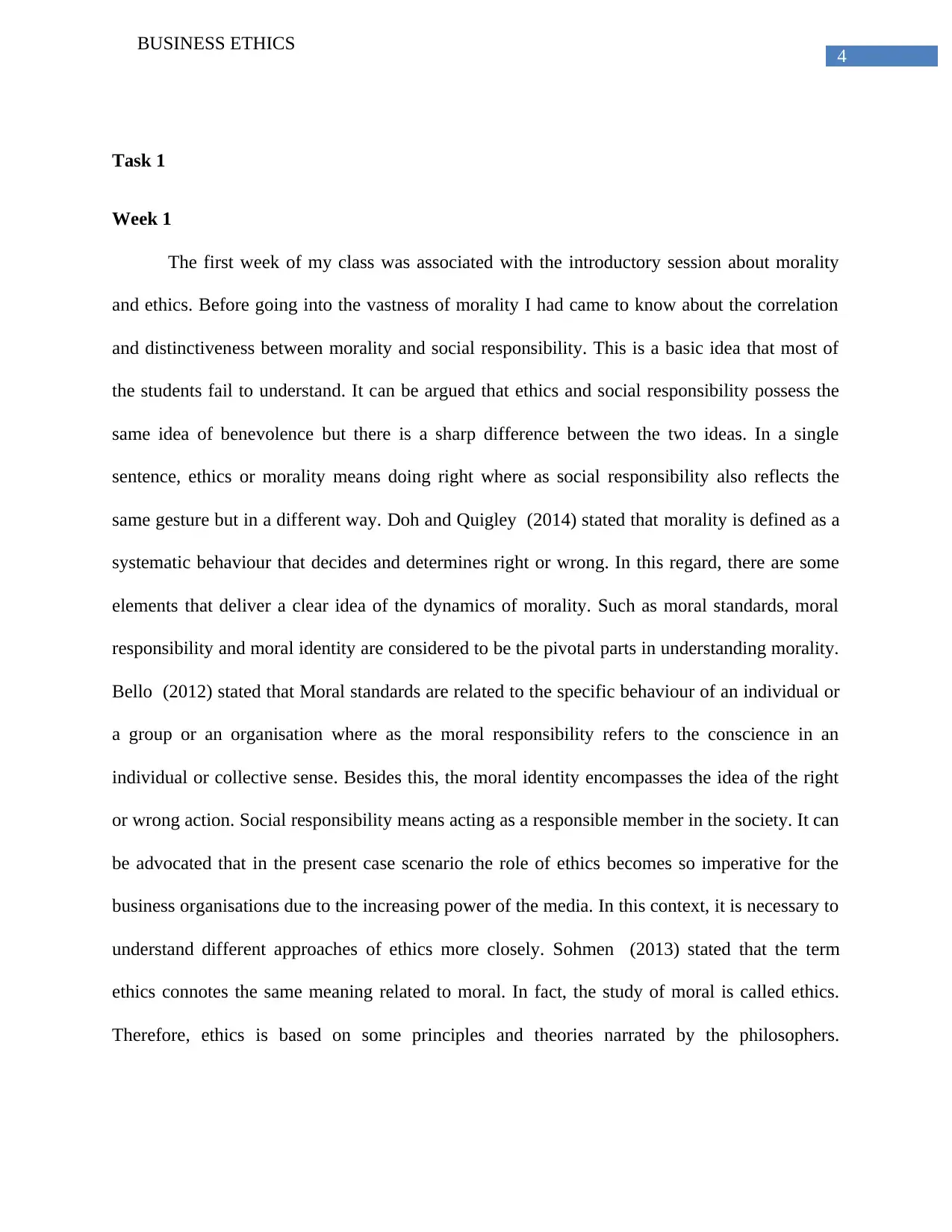
4
BUSINESS ETHICS
Task 1
Week 1
The first week of my class was associated with the introductory session about morality
and ethics. Before going into the vastness of morality I had came to know about the correlation
and distinctiveness between morality and social responsibility. This is a basic idea that most of
the students fail to understand. It can be argued that ethics and social responsibility possess the
same idea of benevolence but there is a sharp difference between the two ideas. In a single
sentence, ethics or morality means doing right where as social responsibility also reflects the
same gesture but in a different way. Doh and Quigley (2014) stated that morality is defined as a
systematic behaviour that decides and determines right or wrong. In this regard, there are some
elements that deliver a clear idea of the dynamics of morality. Such as moral standards, moral
responsibility and moral identity are considered to be the pivotal parts in understanding morality.
Bello (2012) stated that Moral standards are related to the specific behaviour of an individual or
a group or an organisation where as the moral responsibility refers to the conscience in an
individual or collective sense. Besides this, the moral identity encompasses the idea of the right
or wrong action. Social responsibility means acting as a responsible member in the society. It can
be advocated that in the present case scenario the role of ethics becomes so imperative for the
business organisations due to the increasing power of the media. In this context, it is necessary to
understand different approaches of ethics more closely. Sohmen (2013) stated that the term
ethics connotes the same meaning related to moral. In fact, the study of moral is called ethics.
Therefore, ethics is based on some principles and theories narrated by the philosophers.
BUSINESS ETHICS
Task 1
Week 1
The first week of my class was associated with the introductory session about morality
and ethics. Before going into the vastness of morality I had came to know about the correlation
and distinctiveness between morality and social responsibility. This is a basic idea that most of
the students fail to understand. It can be argued that ethics and social responsibility possess the
same idea of benevolence but there is a sharp difference between the two ideas. In a single
sentence, ethics or morality means doing right where as social responsibility also reflects the
same gesture but in a different way. Doh and Quigley (2014) stated that morality is defined as a
systematic behaviour that decides and determines right or wrong. In this regard, there are some
elements that deliver a clear idea of the dynamics of morality. Such as moral standards, moral
responsibility and moral identity are considered to be the pivotal parts in understanding morality.
Bello (2012) stated that Moral standards are related to the specific behaviour of an individual or
a group or an organisation where as the moral responsibility refers to the conscience in an
individual or collective sense. Besides this, the moral identity encompasses the idea of the right
or wrong action. Social responsibility means acting as a responsible member in the society. It can
be advocated that in the present case scenario the role of ethics becomes so imperative for the
business organisations due to the increasing power of the media. In this context, it is necessary to
understand different approaches of ethics more closely. Sohmen (2013) stated that the term
ethics connotes the same meaning related to moral. In fact, the study of moral is called ethics.
Therefore, ethics is based on some principles and theories narrated by the philosophers.
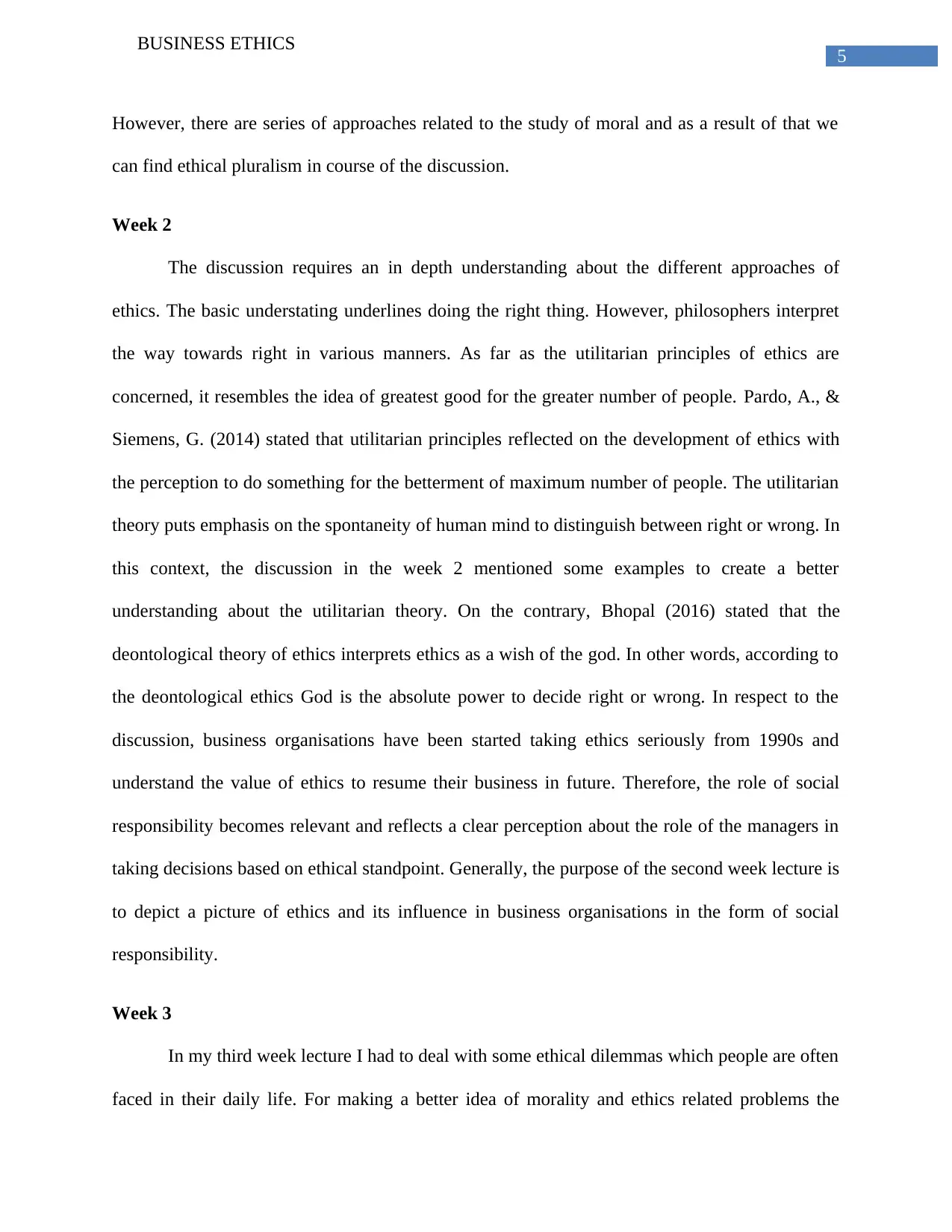
5
BUSINESS ETHICS
However, there are series of approaches related to the study of moral and as a result of that we
can find ethical pluralism in course of the discussion.
Week 2
The discussion requires an in depth understanding about the different approaches of
ethics. The basic understating underlines doing the right thing. However, philosophers interpret
the way towards right in various manners. As far as the utilitarian principles of ethics are
concerned, it resembles the idea of greatest good for the greater number of people. Pardo, A., &
Siemens, G. (2014) stated that utilitarian principles reflected on the development of ethics with
the perception to do something for the betterment of maximum number of people. The utilitarian
theory puts emphasis on the spontaneity of human mind to distinguish between right or wrong. In
this context, the discussion in the week 2 mentioned some examples to create a better
understanding about the utilitarian theory. On the contrary, Bhopal (2016) stated that the
deontological theory of ethics interprets ethics as a wish of the god. In other words, according to
the deontological ethics God is the absolute power to decide right or wrong. In respect to the
discussion, business organisations have been started taking ethics seriously from 1990s and
understand the value of ethics to resume their business in future. Therefore, the role of social
responsibility becomes relevant and reflects a clear perception about the role of the managers in
taking decisions based on ethical standpoint. Generally, the purpose of the second week lecture is
to depict a picture of ethics and its influence in business organisations in the form of social
responsibility.
Week 3
In my third week lecture I had to deal with some ethical dilemmas which people are often
faced in their daily life. For making a better idea of morality and ethics related problems the
BUSINESS ETHICS
However, there are series of approaches related to the study of moral and as a result of that we
can find ethical pluralism in course of the discussion.
Week 2
The discussion requires an in depth understanding about the different approaches of
ethics. The basic understating underlines doing the right thing. However, philosophers interpret
the way towards right in various manners. As far as the utilitarian principles of ethics are
concerned, it resembles the idea of greatest good for the greater number of people. Pardo, A., &
Siemens, G. (2014) stated that utilitarian principles reflected on the development of ethics with
the perception to do something for the betterment of maximum number of people. The utilitarian
theory puts emphasis on the spontaneity of human mind to distinguish between right or wrong. In
this context, the discussion in the week 2 mentioned some examples to create a better
understanding about the utilitarian theory. On the contrary, Bhopal (2016) stated that the
deontological theory of ethics interprets ethics as a wish of the god. In other words, according to
the deontological ethics God is the absolute power to decide right or wrong. In respect to the
discussion, business organisations have been started taking ethics seriously from 1990s and
understand the value of ethics to resume their business in future. Therefore, the role of social
responsibility becomes relevant and reflects a clear perception about the role of the managers in
taking decisions based on ethical standpoint. Generally, the purpose of the second week lecture is
to depict a picture of ethics and its influence in business organisations in the form of social
responsibility.
Week 3
In my third week lecture I had to deal with some ethical dilemmas which people are often
faced in their daily life. For making a better idea of morality and ethics related problems the
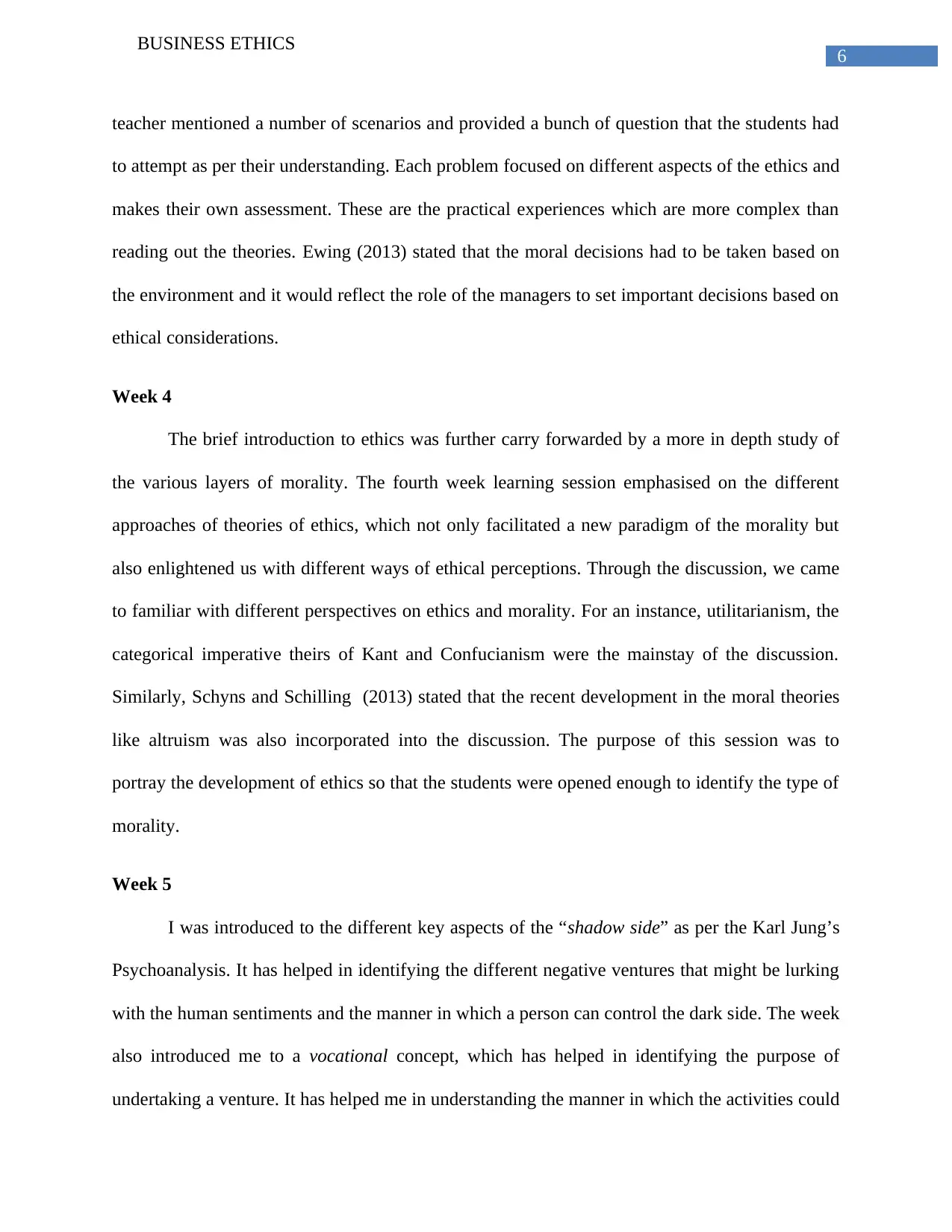
6
BUSINESS ETHICS
teacher mentioned a number of scenarios and provided a bunch of question that the students had
to attempt as per their understanding. Each problem focused on different aspects of the ethics and
makes their own assessment. These are the practical experiences which are more complex than
reading out the theories. Ewing (2013) stated that the moral decisions had to be taken based on
the environment and it would reflect the role of the managers to set important decisions based on
ethical considerations.
Week 4
The brief introduction to ethics was further carry forwarded by a more in depth study of
the various layers of morality. The fourth week learning session emphasised on the different
approaches of theories of ethics, which not only facilitated a new paradigm of the morality but
also enlightened us with different ways of ethical perceptions. Through the discussion, we came
to familiar with different perspectives on ethics and morality. For an instance, utilitarianism, the
categorical imperative theirs of Kant and Confucianism were the mainstay of the discussion.
Similarly, Schyns and Schilling (2013) stated that the recent development in the moral theories
like altruism was also incorporated into the discussion. The purpose of this session was to
portray the development of ethics so that the students were opened enough to identify the type of
morality.
Week 5
I was introduced to the different key aspects of the “shadow side” as per the Karl Jung’s
Psychoanalysis. It has helped in identifying the different negative ventures that might be lurking
with the human sentiments and the manner in which a person can control the dark side. The week
also introduced me to a vocational concept, which has helped in identifying the purpose of
undertaking a venture. It has helped me in understanding the manner in which the activities could
BUSINESS ETHICS
teacher mentioned a number of scenarios and provided a bunch of question that the students had
to attempt as per their understanding. Each problem focused on different aspects of the ethics and
makes their own assessment. These are the practical experiences which are more complex than
reading out the theories. Ewing (2013) stated that the moral decisions had to be taken based on
the environment and it would reflect the role of the managers to set important decisions based on
ethical considerations.
Week 4
The brief introduction to ethics was further carry forwarded by a more in depth study of
the various layers of morality. The fourth week learning session emphasised on the different
approaches of theories of ethics, which not only facilitated a new paradigm of the morality but
also enlightened us with different ways of ethical perceptions. Through the discussion, we came
to familiar with different perspectives on ethics and morality. For an instance, utilitarianism, the
categorical imperative theirs of Kant and Confucianism were the mainstay of the discussion.
Similarly, Schyns and Schilling (2013) stated that the recent development in the moral theories
like altruism was also incorporated into the discussion. The purpose of this session was to
portray the development of ethics so that the students were opened enough to identify the type of
morality.
Week 5
I was introduced to the different key aspects of the “shadow side” as per the Karl Jung’s
Psychoanalysis. It has helped in identifying the different negative ventures that might be lurking
with the human sentiments and the manner in which a person can control the dark side. The week
also introduced me to a vocational concept, which has helped in identifying the purpose of
undertaking a venture. It has helped me in understanding the manner in which the activities could
Paraphrase This Document
Need a fresh take? Get an instant paraphrase of this document with our AI Paraphraser
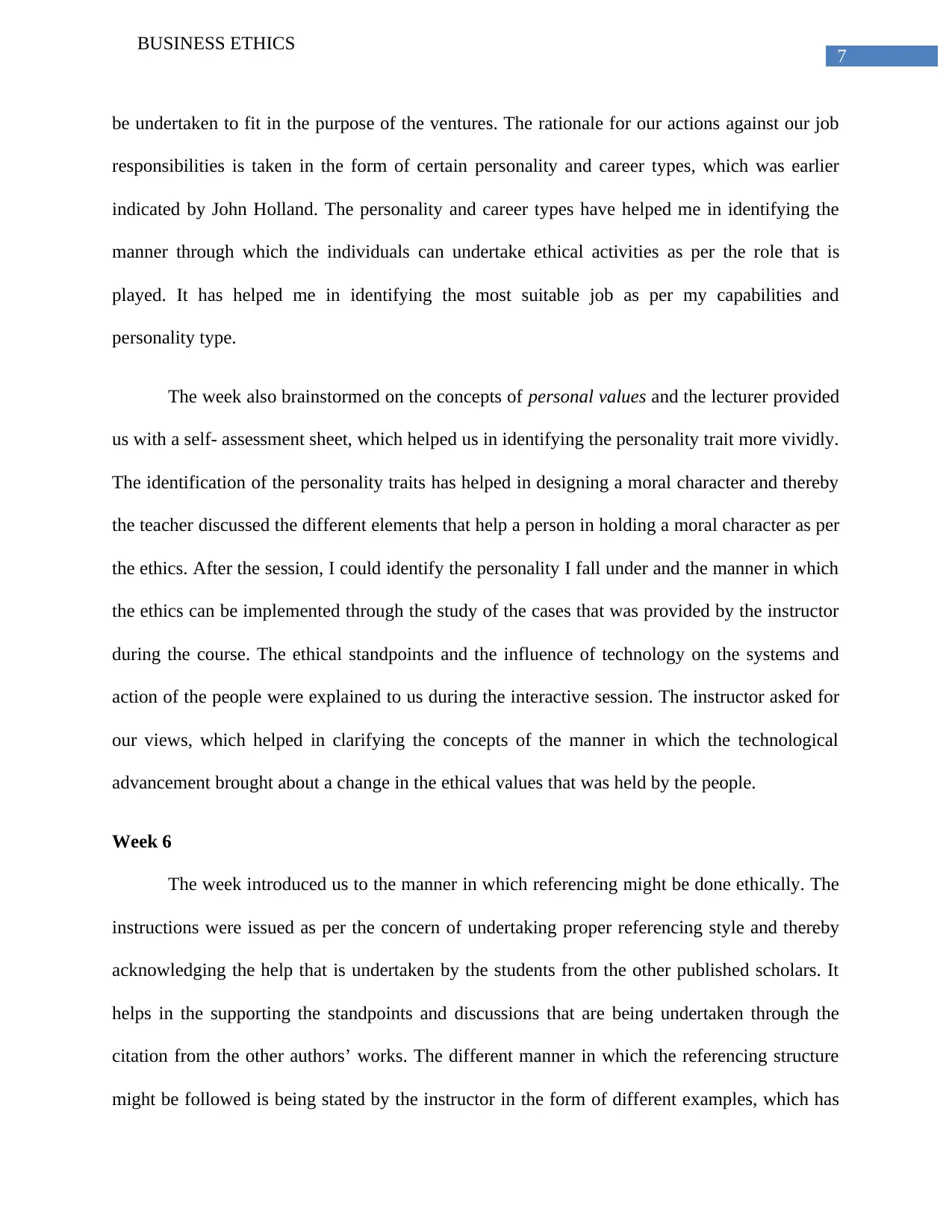
7
BUSINESS ETHICS
be undertaken to fit in the purpose of the ventures. The rationale for our actions against our job
responsibilities is taken in the form of certain personality and career types, which was earlier
indicated by John Holland. The personality and career types have helped me in identifying the
manner through which the individuals can undertake ethical activities as per the role that is
played. It has helped me in identifying the most suitable job as per my capabilities and
personality type.
The week also brainstormed on the concepts of personal values and the lecturer provided
us with a self- assessment sheet, which helped us in identifying the personality trait more vividly.
The identification of the personality traits has helped in designing a moral character and thereby
the teacher discussed the different elements that help a person in holding a moral character as per
the ethics. After the session, I could identify the personality I fall under and the manner in which
the ethics can be implemented through the study of the cases that was provided by the instructor
during the course. The ethical standpoints and the influence of technology on the systems and
action of the people were explained to us during the interactive session. The instructor asked for
our views, which helped in clarifying the concepts of the manner in which the technological
advancement brought about a change in the ethical values that was held by the people.
Week 6
The week introduced us to the manner in which referencing might be done ethically. The
instructions were issued as per the concern of undertaking proper referencing style and thereby
acknowledging the help that is undertaken by the students from the other published scholars. It
helps in the supporting the standpoints and discussions that are being undertaken through the
citation from the other authors’ works. The different manner in which the referencing structure
might be followed is being stated by the instructor in the form of different examples, which has
BUSINESS ETHICS
be undertaken to fit in the purpose of the ventures. The rationale for our actions against our job
responsibilities is taken in the form of certain personality and career types, which was earlier
indicated by John Holland. The personality and career types have helped me in identifying the
manner through which the individuals can undertake ethical activities as per the role that is
played. It has helped me in identifying the most suitable job as per my capabilities and
personality type.
The week also brainstormed on the concepts of personal values and the lecturer provided
us with a self- assessment sheet, which helped us in identifying the personality trait more vividly.
The identification of the personality traits has helped in designing a moral character and thereby
the teacher discussed the different elements that help a person in holding a moral character as per
the ethics. After the session, I could identify the personality I fall under and the manner in which
the ethics can be implemented through the study of the cases that was provided by the instructor
during the course. The ethical standpoints and the influence of technology on the systems and
action of the people were explained to us during the interactive session. The instructor asked for
our views, which helped in clarifying the concepts of the manner in which the technological
advancement brought about a change in the ethical values that was held by the people.
Week 6
The week introduced us to the manner in which referencing might be done ethically. The
instructions were issued as per the concern of undertaking proper referencing style and thereby
acknowledging the help that is undertaken by the students from the other published scholars. It
helps in the supporting the standpoints and discussions that are being undertaken through the
citation from the other authors’ works. The different manner in which the referencing structure
might be followed is being stated by the instructor in the form of different examples, which has
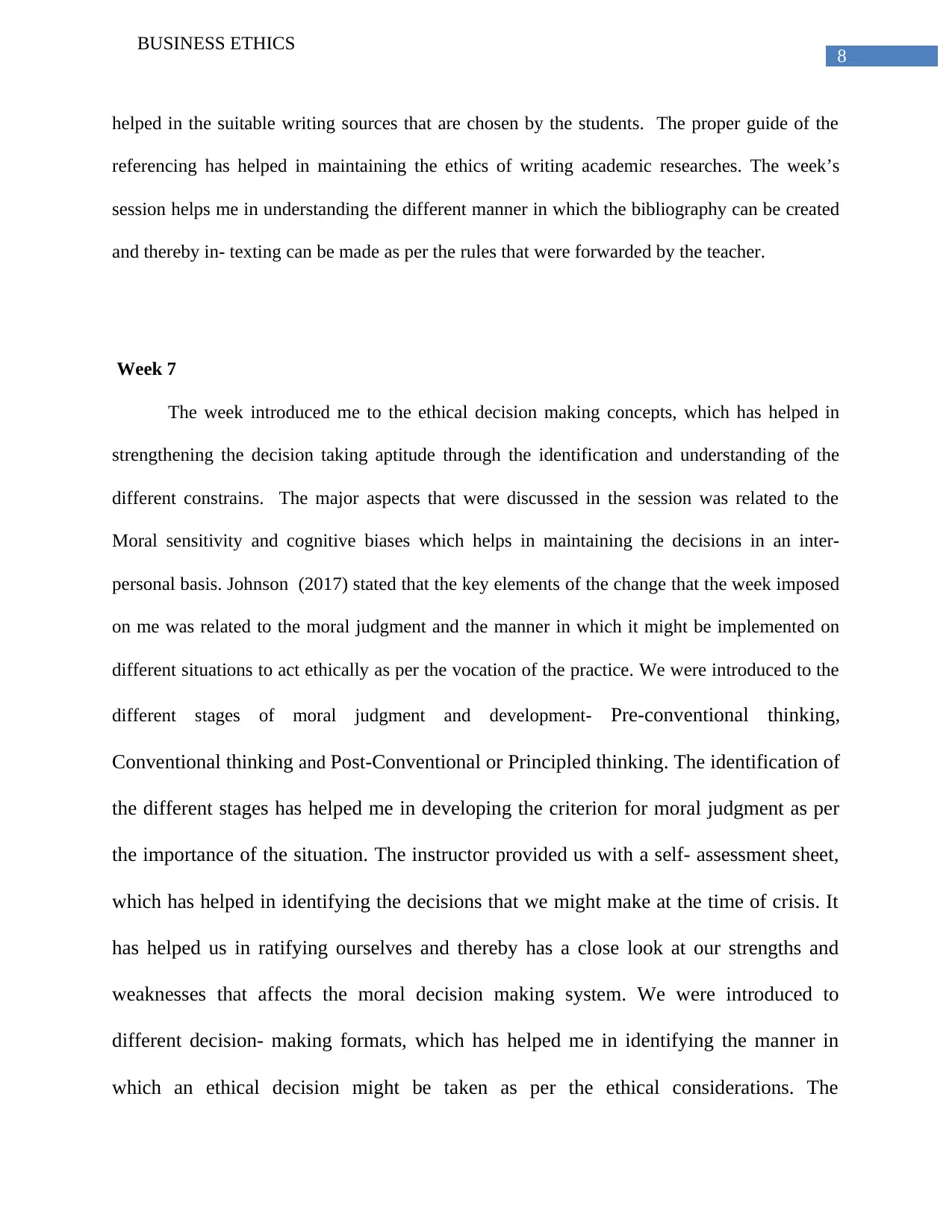
8
BUSINESS ETHICS
helped in the suitable writing sources that are chosen by the students. The proper guide of the
referencing has helped in maintaining the ethics of writing academic researches. The week’s
session helps me in understanding the different manner in which the bibliography can be created
and thereby in- texting can be made as per the rules that were forwarded by the teacher.
Week 7
The week introduced me to the ethical decision making concepts, which has helped in
strengthening the decision taking aptitude through the identification and understanding of the
different constrains. The major aspects that were discussed in the session was related to the
Moral sensitivity and cognitive biases which helps in maintaining the decisions in an inter-
personal basis. Johnson (2017) stated that the key elements of the change that the week imposed
on me was related to the moral judgment and the manner in which it might be implemented on
different situations to act ethically as per the vocation of the practice. We were introduced to the
different stages of moral judgment and development- Pre-conventional thinking,
Conventional thinking and Post-Conventional or Principled thinking. The identification of
the different stages has helped me in developing the criterion for moral judgment as per
the importance of the situation. The instructor provided us with a self- assessment sheet,
which has helped in identifying the decisions that we might make at the time of crisis. It
has helped us in ratifying ourselves and thereby has a close look at our strengths and
weaknesses that affects the moral decision making system. We were introduced to
different decision- making formats, which has helped me in identifying the manner in
which an ethical decision might be taken as per the ethical considerations. The
BUSINESS ETHICS
helped in the suitable writing sources that are chosen by the students. The proper guide of the
referencing has helped in maintaining the ethics of writing academic researches. The week’s
session helps me in understanding the different manner in which the bibliography can be created
and thereby in- texting can be made as per the rules that were forwarded by the teacher.
Week 7
The week introduced me to the ethical decision making concepts, which has helped in
strengthening the decision taking aptitude through the identification and understanding of the
different constrains. The major aspects that were discussed in the session was related to the
Moral sensitivity and cognitive biases which helps in maintaining the decisions in an inter-
personal basis. Johnson (2017) stated that the key elements of the change that the week imposed
on me was related to the moral judgment and the manner in which it might be implemented on
different situations to act ethically as per the vocation of the practice. We were introduced to the
different stages of moral judgment and development- Pre-conventional thinking,
Conventional thinking and Post-Conventional or Principled thinking. The identification of
the different stages has helped me in developing the criterion for moral judgment as per
the importance of the situation. The instructor provided us with a self- assessment sheet,
which has helped in identifying the decisions that we might make at the time of crisis. It
has helped us in ratifying ourselves and thereby has a close look at our strengths and
weaknesses that affects the moral decision making system. We were introduced to
different decision- making formats, which has helped me in identifying the manner in
which an ethical decision might be taken as per the ethical considerations. The
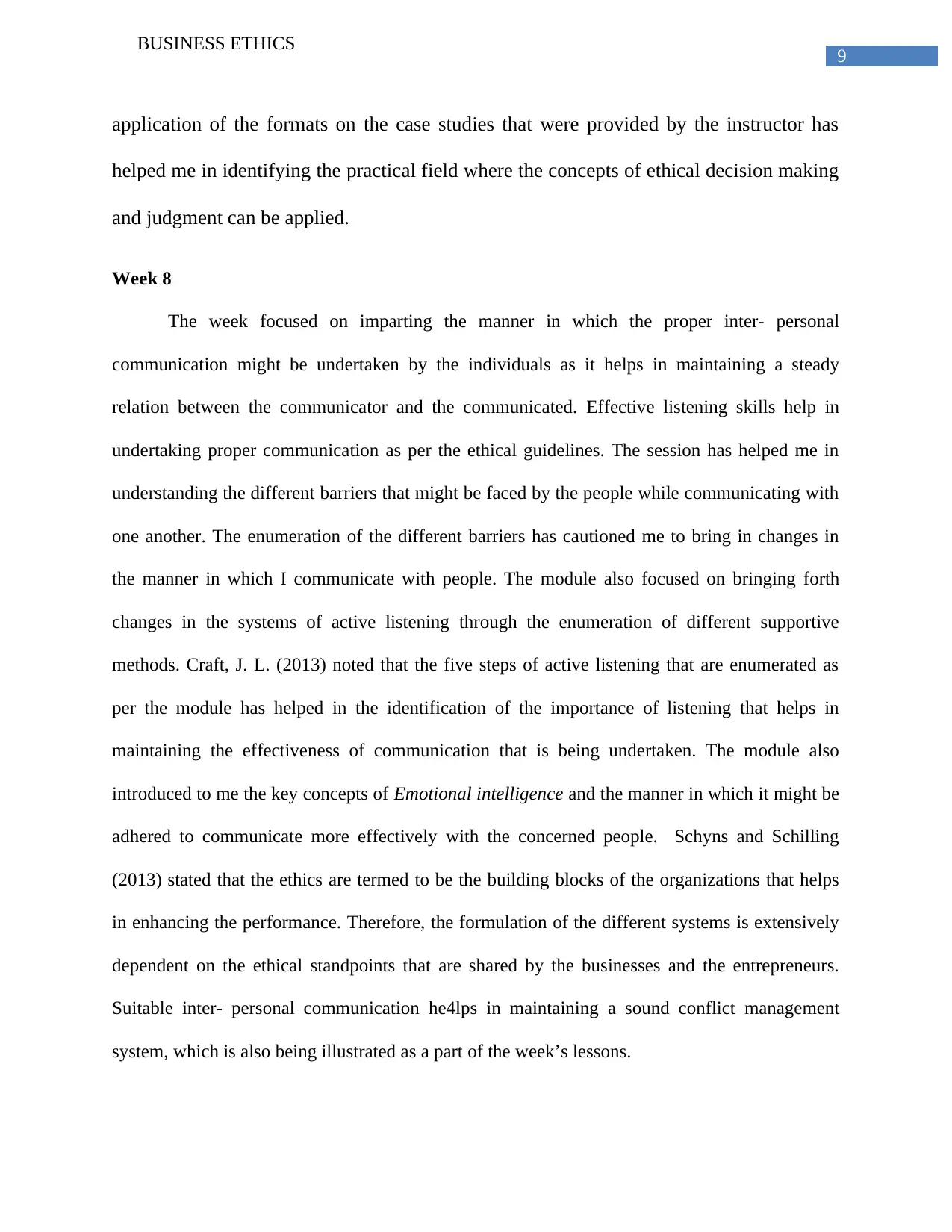
9
BUSINESS ETHICS
application of the formats on the case studies that were provided by the instructor has
helped me in identifying the practical field where the concepts of ethical decision making
and judgment can be applied.
Week 8
The week focused on imparting the manner in which the proper inter- personal
communication might be undertaken by the individuals as it helps in maintaining a steady
relation between the communicator and the communicated. Effective listening skills help in
undertaking proper communication as per the ethical guidelines. The session has helped me in
understanding the different barriers that might be faced by the people while communicating with
one another. The enumeration of the different barriers has cautioned me to bring in changes in
the manner in which I communicate with people. The module also focused on bringing forth
changes in the systems of active listening through the enumeration of different supportive
methods. Craft, J. L. (2013) noted that the five steps of active listening that are enumerated as
per the module has helped in the identification of the importance of listening that helps in
maintaining the effectiveness of communication that is being undertaken. The module also
introduced to me the key concepts of Emotional intelligence and the manner in which it might be
adhered to communicate more effectively with the concerned people. Schyns and Schilling
(2013) stated that the ethics are termed to be the building blocks of the organizations that helps
in enhancing the performance. Therefore, the formulation of the different systems is extensively
dependent on the ethical standpoints that are shared by the businesses and the entrepreneurs.
Suitable inter- personal communication he4lps in maintaining a sound conflict management
system, which is also being illustrated as a part of the week’s lessons.
BUSINESS ETHICS
application of the formats on the case studies that were provided by the instructor has
helped me in identifying the practical field where the concepts of ethical decision making
and judgment can be applied.
Week 8
The week focused on imparting the manner in which the proper inter- personal
communication might be undertaken by the individuals as it helps in maintaining a steady
relation between the communicator and the communicated. Effective listening skills help in
undertaking proper communication as per the ethical guidelines. The session has helped me in
understanding the different barriers that might be faced by the people while communicating with
one another. The enumeration of the different barriers has cautioned me to bring in changes in
the manner in which I communicate with people. The module also focused on bringing forth
changes in the systems of active listening through the enumeration of different supportive
methods. Craft, J. L. (2013) noted that the five steps of active listening that are enumerated as
per the module has helped in the identification of the importance of listening that helps in
maintaining the effectiveness of communication that is being undertaken. The module also
introduced to me the key concepts of Emotional intelligence and the manner in which it might be
adhered to communicate more effectively with the concerned people. Schyns and Schilling
(2013) stated that the ethics are termed to be the building blocks of the organizations that helps
in enhancing the performance. Therefore, the formulation of the different systems is extensively
dependent on the ethical standpoints that are shared by the businesses and the entrepreneurs.
Suitable inter- personal communication he4lps in maintaining a sound conflict management
system, which is also being illustrated as a part of the week’s lessons.
Secure Best Marks with AI Grader
Need help grading? Try our AI Grader for instant feedback on your assignments.
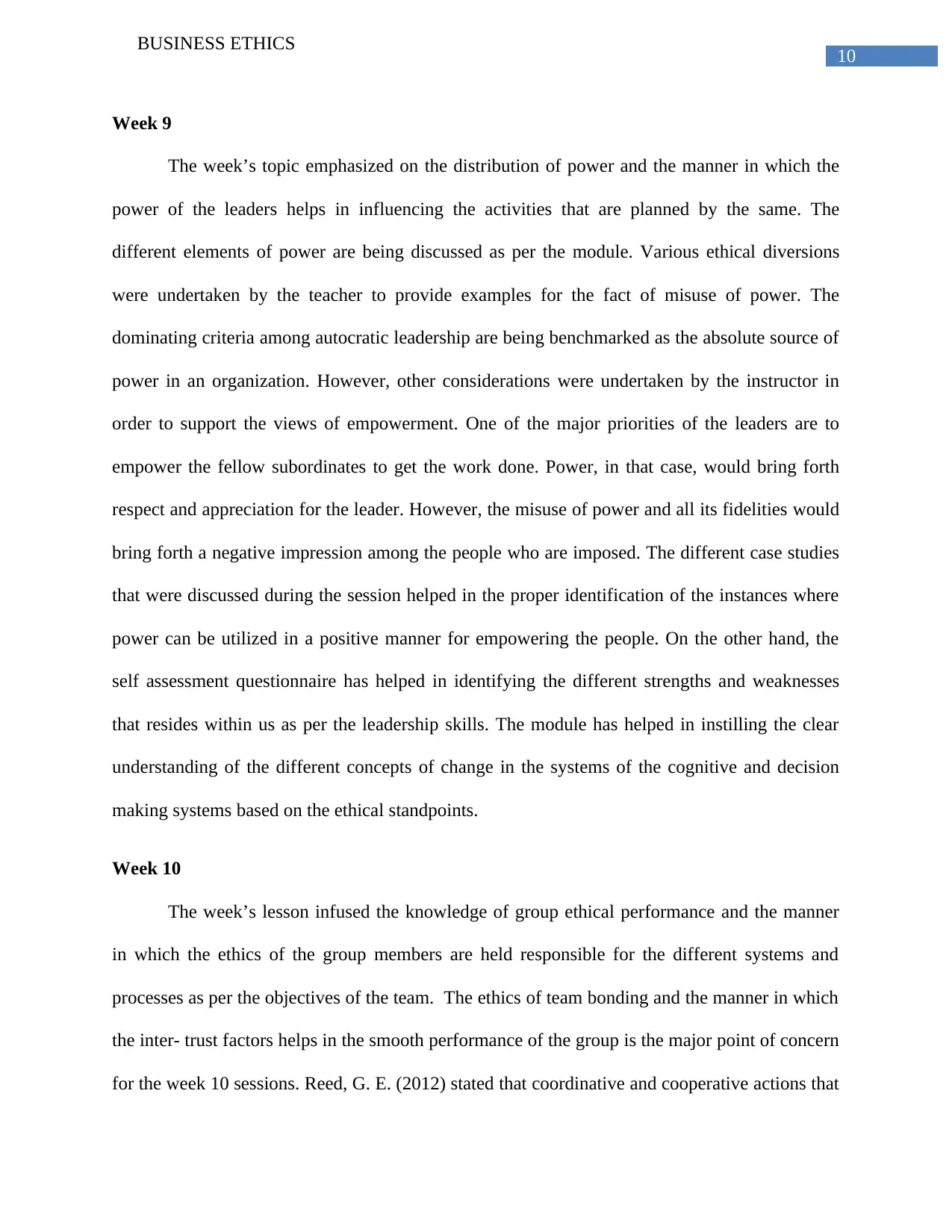
10
BUSINESS ETHICS
Week 9
The week’s topic emphasized on the distribution of power and the manner in which the
power of the leaders helps in influencing the activities that are planned by the same. The
different elements of power are being discussed as per the module. Various ethical diversions
were undertaken by the teacher to provide examples for the fact of misuse of power. The
dominating criteria among autocratic leadership are being benchmarked as the absolute source of
power in an organization. However, other considerations were undertaken by the instructor in
order to support the views of empowerment. One of the major priorities of the leaders are to
empower the fellow subordinates to get the work done. Power, in that case, would bring forth
respect and appreciation for the leader. However, the misuse of power and all its fidelities would
bring forth a negative impression among the people who are imposed. The different case studies
that were discussed during the session helped in the proper identification of the instances where
power can be utilized in a positive manner for empowering the people. On the other hand, the
self assessment questionnaire has helped in identifying the different strengths and weaknesses
that resides within us as per the leadership skills. The module has helped in instilling the clear
understanding of the different concepts of change in the systems of the cognitive and decision
making systems based on the ethical standpoints.
Week 10
The week’s lesson infused the knowledge of group ethical performance and the manner
in which the ethics of the group members are held responsible for the different systems and
processes as per the objectives of the team. The ethics of team bonding and the manner in which
the inter- trust factors helps in the smooth performance of the group is the major point of concern
for the week 10 sessions. Reed, G. E. (2012) stated that coordinative and cooperative actions that
BUSINESS ETHICS
Week 9
The week’s topic emphasized on the distribution of power and the manner in which the
power of the leaders helps in influencing the activities that are planned by the same. The
different elements of power are being discussed as per the module. Various ethical diversions
were undertaken by the teacher to provide examples for the fact of misuse of power. The
dominating criteria among autocratic leadership are being benchmarked as the absolute source of
power in an organization. However, other considerations were undertaken by the instructor in
order to support the views of empowerment. One of the major priorities of the leaders are to
empower the fellow subordinates to get the work done. Power, in that case, would bring forth
respect and appreciation for the leader. However, the misuse of power and all its fidelities would
bring forth a negative impression among the people who are imposed. The different case studies
that were discussed during the session helped in the proper identification of the instances where
power can be utilized in a positive manner for empowering the people. On the other hand, the
self assessment questionnaire has helped in identifying the different strengths and weaknesses
that resides within us as per the leadership skills. The module has helped in instilling the clear
understanding of the different concepts of change in the systems of the cognitive and decision
making systems based on the ethical standpoints.
Week 10
The week’s lesson infused the knowledge of group ethical performance and the manner
in which the ethics of the group members are held responsible for the different systems and
processes as per the objectives of the team. The ethics of team bonding and the manner in which
the inter- trust factors helps in the smooth performance of the group is the major point of concern
for the week 10 sessions. Reed, G. E. (2012) stated that coordinative and cooperative actions that
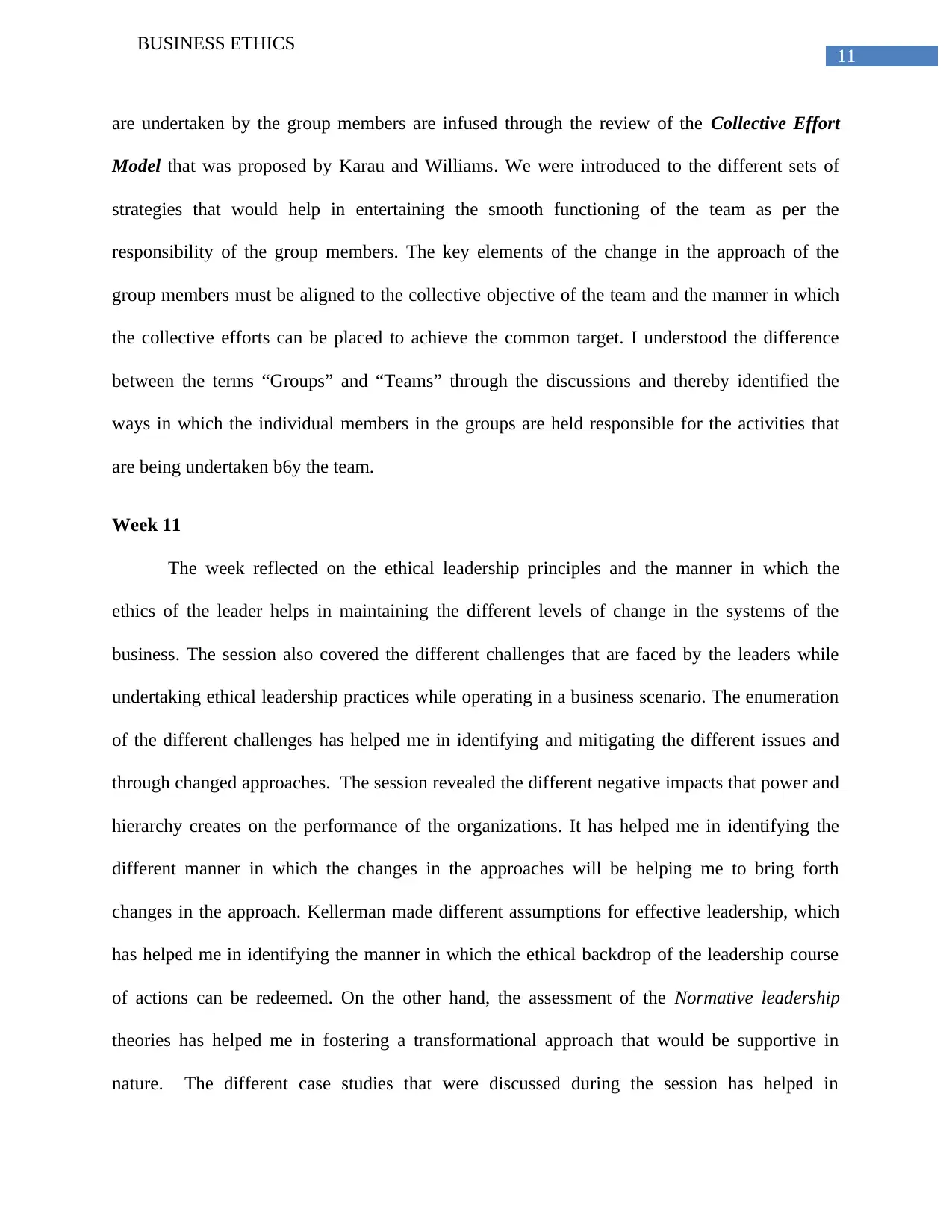
11
BUSINESS ETHICS
are undertaken by the group members are infused through the review of the Collective Effort
Model that was proposed by Karau and Williams. We were introduced to the different sets of
strategies that would help in entertaining the smooth functioning of the team as per the
responsibility of the group members. The key elements of the change in the approach of the
group members must be aligned to the collective objective of the team and the manner in which
the collective efforts can be placed to achieve the common target. I understood the difference
between the terms “Groups” and “Teams” through the discussions and thereby identified the
ways in which the individual members in the groups are held responsible for the activities that
are being undertaken b6y the team.
Week 11
The week reflected on the ethical leadership principles and the manner in which the
ethics of the leader helps in maintaining the different levels of change in the systems of the
business. The session also covered the different challenges that are faced by the leaders while
undertaking ethical leadership practices while operating in a business scenario. The enumeration
of the different challenges has helped me in identifying and mitigating the different issues and
through changed approaches. The session revealed the different negative impacts that power and
hierarchy creates on the performance of the organizations. It has helped me in identifying the
different manner in which the changes in the approaches will be helping me to bring forth
changes in the approach. Kellerman made different assumptions for effective leadership, which
has helped me in identifying the manner in which the ethical backdrop of the leadership course
of actions can be redeemed. On the other hand, the assessment of the Normative leadership
theories has helped me in fostering a transformational approach that would be supportive in
nature. The different case studies that were discussed during the session has helped in
BUSINESS ETHICS
are undertaken by the group members are infused through the review of the Collective Effort
Model that was proposed by Karau and Williams. We were introduced to the different sets of
strategies that would help in entertaining the smooth functioning of the team as per the
responsibility of the group members. The key elements of the change in the approach of the
group members must be aligned to the collective objective of the team and the manner in which
the collective efforts can be placed to achieve the common target. I understood the difference
between the terms “Groups” and “Teams” through the discussions and thereby identified the
ways in which the individual members in the groups are held responsible for the activities that
are being undertaken b6y the team.
Week 11
The week reflected on the ethical leadership principles and the manner in which the
ethics of the leader helps in maintaining the different levels of change in the systems of the
business. The session also covered the different challenges that are faced by the leaders while
undertaking ethical leadership practices while operating in a business scenario. The enumeration
of the different challenges has helped me in identifying and mitigating the different issues and
through changed approaches. The session revealed the different negative impacts that power and
hierarchy creates on the performance of the organizations. It has helped me in identifying the
different manner in which the changes in the approaches will be helping me to bring forth
changes in the approach. Kellerman made different assumptions for effective leadership, which
has helped me in identifying the manner in which the ethical backdrop of the leadership course
of actions can be redeemed. On the other hand, the assessment of the Normative leadership
theories has helped me in fostering a transformational approach that would be supportive in
nature. The different case studies that were discussed during the session has helped in
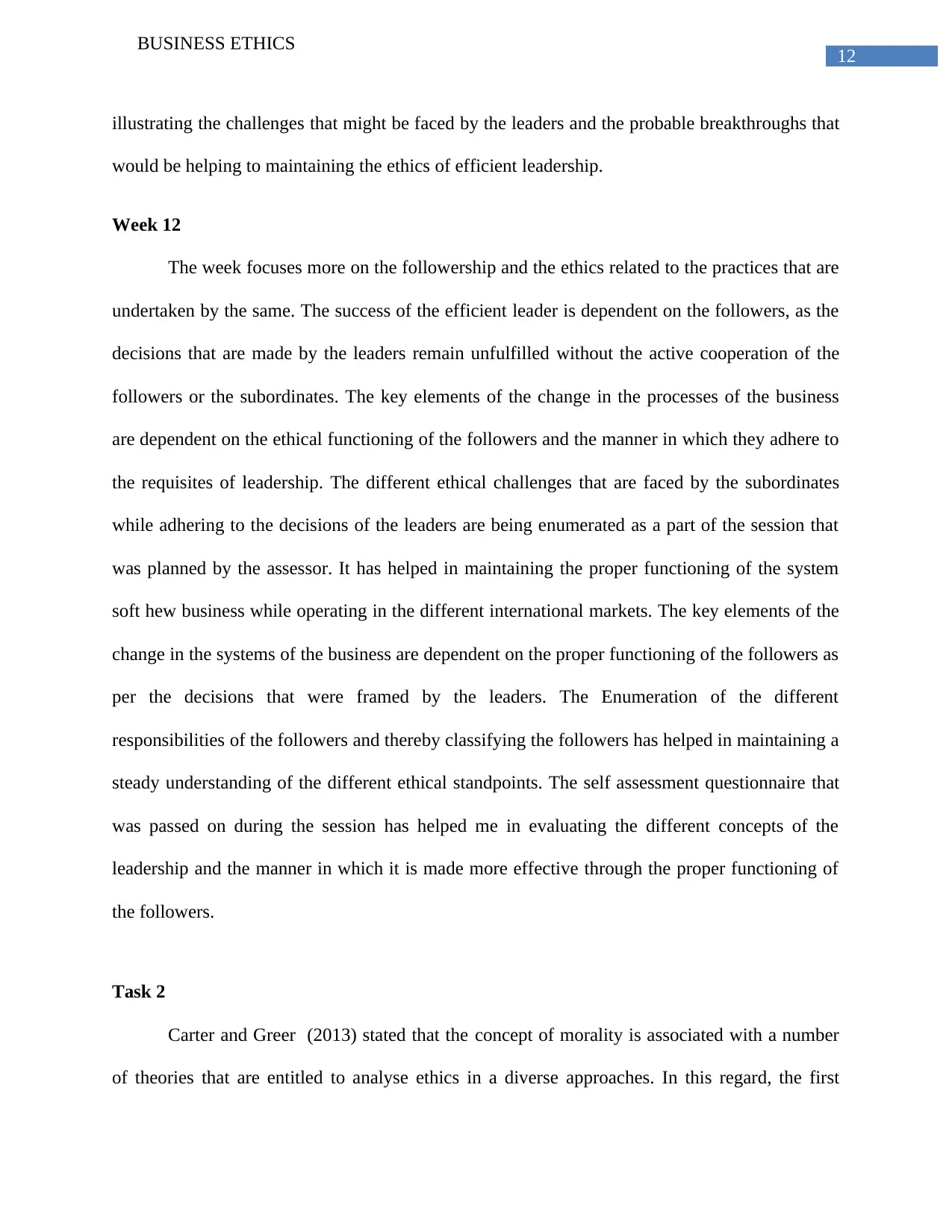
12
BUSINESS ETHICS
illustrating the challenges that might be faced by the leaders and the probable breakthroughs that
would be helping to maintaining the ethics of efficient leadership.
Week 12
The week focuses more on the followership and the ethics related to the practices that are
undertaken by the same. The success of the efficient leader is dependent on the followers, as the
decisions that are made by the leaders remain unfulfilled without the active cooperation of the
followers or the subordinates. The key elements of the change in the processes of the business
are dependent on the ethical functioning of the followers and the manner in which they adhere to
the requisites of leadership. The different ethical challenges that are faced by the subordinates
while adhering to the decisions of the leaders are being enumerated as a part of the session that
was planned by the assessor. It has helped in maintaining the proper functioning of the system
soft hew business while operating in the different international markets. The key elements of the
change in the systems of the business are dependent on the proper functioning of the followers as
per the decisions that were framed by the leaders. The Enumeration of the different
responsibilities of the followers and thereby classifying the followers has helped in maintaining a
steady understanding of the different ethical standpoints. The self assessment questionnaire that
was passed on during the session has helped me in evaluating the different concepts of the
leadership and the manner in which it is made more effective through the proper functioning of
the followers.
Task 2
Carter and Greer (2013) stated that the concept of morality is associated with a number
of theories that are entitled to analyse ethics in a diverse approaches. In this regard, the first
BUSINESS ETHICS
illustrating the challenges that might be faced by the leaders and the probable breakthroughs that
would be helping to maintaining the ethics of efficient leadership.
Week 12
The week focuses more on the followership and the ethics related to the practices that are
undertaken by the same. The success of the efficient leader is dependent on the followers, as the
decisions that are made by the leaders remain unfulfilled without the active cooperation of the
followers or the subordinates. The key elements of the change in the processes of the business
are dependent on the ethical functioning of the followers and the manner in which they adhere to
the requisites of leadership. The different ethical challenges that are faced by the subordinates
while adhering to the decisions of the leaders are being enumerated as a part of the session that
was planned by the assessor. It has helped in maintaining the proper functioning of the system
soft hew business while operating in the different international markets. The key elements of the
change in the systems of the business are dependent on the proper functioning of the followers as
per the decisions that were framed by the leaders. The Enumeration of the different
responsibilities of the followers and thereby classifying the followers has helped in maintaining a
steady understanding of the different ethical standpoints. The self assessment questionnaire that
was passed on during the session has helped me in evaluating the different concepts of the
leadership and the manner in which it is made more effective through the proper functioning of
the followers.
Task 2
Carter and Greer (2013) stated that the concept of morality is associated with a number
of theories that are entitled to analyse ethics in a diverse approaches. In this regard, the first
Paraphrase This Document
Need a fresh take? Get an instant paraphrase of this document with our AI Paraphraser
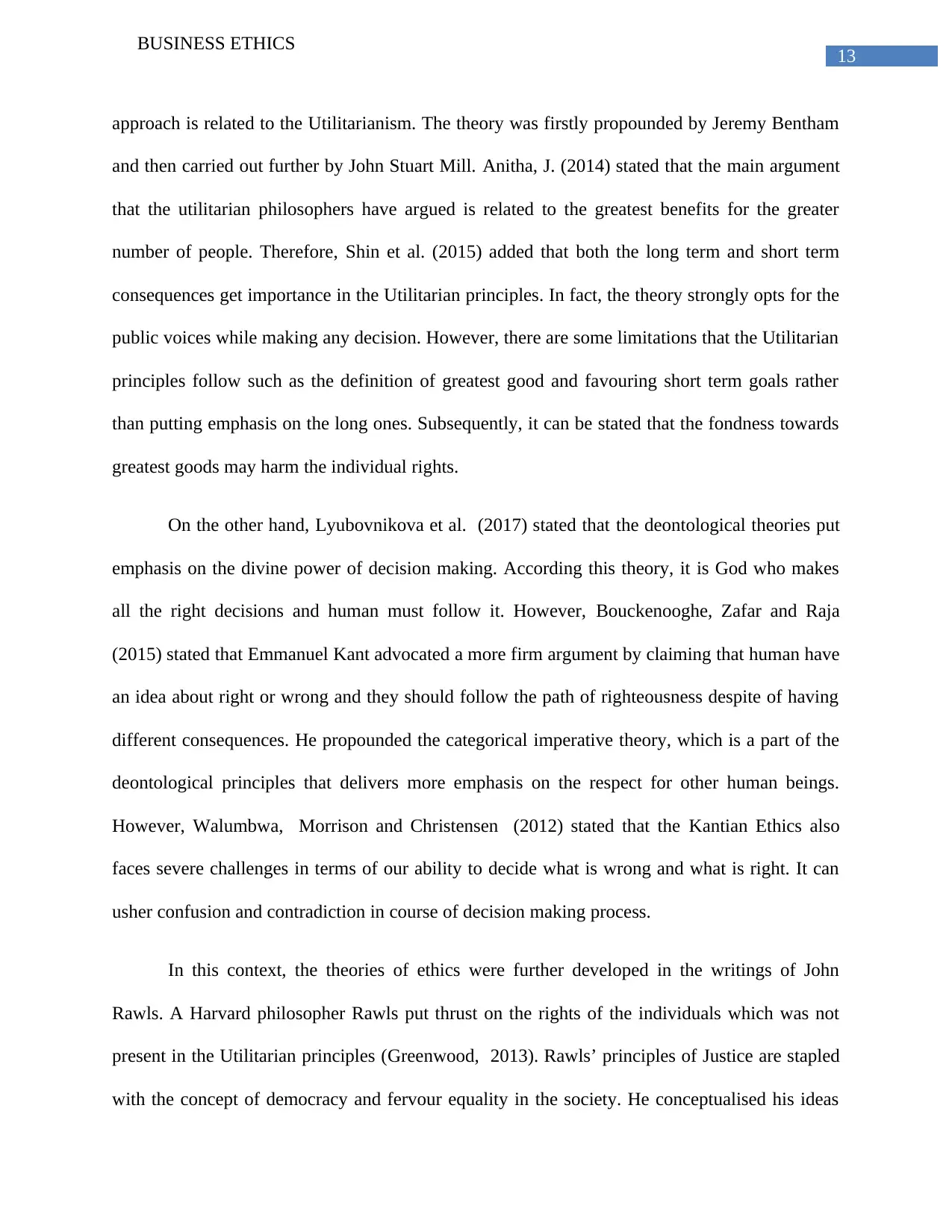
13
BUSINESS ETHICS
approach is related to the Utilitarianism. The theory was firstly propounded by Jeremy Bentham
and then carried out further by John Stuart Mill. Anitha, J. (2014) stated that the main argument
that the utilitarian philosophers have argued is related to the greatest benefits for the greater
number of people. Therefore, Shin et al. (2015) added that both the long term and short term
consequences get importance in the Utilitarian principles. In fact, the theory strongly opts for the
public voices while making any decision. However, there are some limitations that the Utilitarian
principles follow such as the definition of greatest good and favouring short term goals rather
than putting emphasis on the long ones. Subsequently, it can be stated that the fondness towards
greatest goods may harm the individual rights.
On the other hand, Lyubovnikova et al. (2017) stated that the deontological theories put
emphasis on the divine power of decision making. According this theory, it is God who makes
all the right decisions and human must follow it. However, Bouckenooghe, Zafar and Raja
(2015) stated that Emmanuel Kant advocated a more firm argument by claiming that human have
an idea about right or wrong and they should follow the path of righteousness despite of having
different consequences. He propounded the categorical imperative theory, which is a part of the
deontological principles that delivers more emphasis on the respect for other human beings.
However, Walumbwa, Morrison and Christensen (2012) stated that the Kantian Ethics also
faces severe challenges in terms of our ability to decide what is wrong and what is right. It can
usher confusion and contradiction in course of decision making process.
In this context, the theories of ethics were further developed in the writings of John
Rawls. A Harvard philosopher Rawls put thrust on the rights of the individuals which was not
present in the Utilitarian principles (Greenwood, 2013). Rawls’ principles of Justice are stapled
with the concept of democracy and fervour equality in the society. He conceptualised his ideas
BUSINESS ETHICS
approach is related to the Utilitarianism. The theory was firstly propounded by Jeremy Bentham
and then carried out further by John Stuart Mill. Anitha, J. (2014) stated that the main argument
that the utilitarian philosophers have argued is related to the greatest benefits for the greater
number of people. Therefore, Shin et al. (2015) added that both the long term and short term
consequences get importance in the Utilitarian principles. In fact, the theory strongly opts for the
public voices while making any decision. However, there are some limitations that the Utilitarian
principles follow such as the definition of greatest good and favouring short term goals rather
than putting emphasis on the long ones. Subsequently, it can be stated that the fondness towards
greatest goods may harm the individual rights.
On the other hand, Lyubovnikova et al. (2017) stated that the deontological theories put
emphasis on the divine power of decision making. According this theory, it is God who makes
all the right decisions and human must follow it. However, Bouckenooghe, Zafar and Raja
(2015) stated that Emmanuel Kant advocated a more firm argument by claiming that human have
an idea about right or wrong and they should follow the path of righteousness despite of having
different consequences. He propounded the categorical imperative theory, which is a part of the
deontological principles that delivers more emphasis on the respect for other human beings.
However, Walumbwa, Morrison and Christensen (2012) stated that the Kantian Ethics also
faces severe challenges in terms of our ability to decide what is wrong and what is right. It can
usher confusion and contradiction in course of decision making process.
In this context, the theories of ethics were further developed in the writings of John
Rawls. A Harvard philosopher Rawls put thrust on the rights of the individuals which was not
present in the Utilitarian principles (Greenwood, 2013). Rawls’ principles of Justice are stapled
with the concept of democracy and fervour equality in the society. He conceptualised his ideas
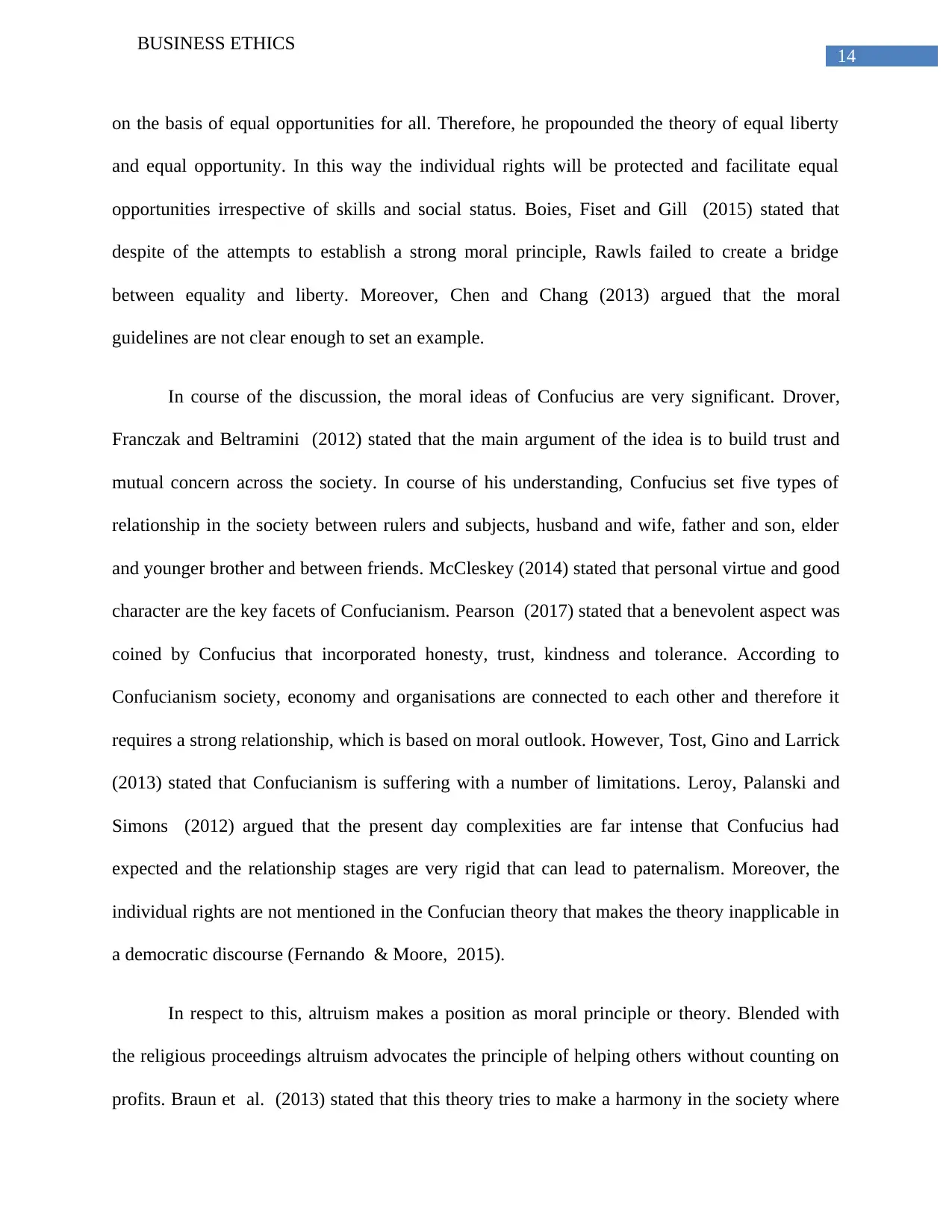
14
BUSINESS ETHICS
on the basis of equal opportunities for all. Therefore, he propounded the theory of equal liberty
and equal opportunity. In this way the individual rights will be protected and facilitate equal
opportunities irrespective of skills and social status. Boies, Fiset and Gill (2015) stated that
despite of the attempts to establish a strong moral principle, Rawls failed to create a bridge
between equality and liberty. Moreover, Chen and Chang (2013) argued that the moral
guidelines are not clear enough to set an example.
In course of the discussion, the moral ideas of Confucius are very significant. Drover,
Franczak and Beltramini (2012) stated that the main argument of the idea is to build trust and
mutual concern across the society. In course of his understanding, Confucius set five types of
relationship in the society between rulers and subjects, husband and wife, father and son, elder
and younger brother and between friends. McCleskey (2014) stated that personal virtue and good
character are the key facets of Confucianism. Pearson (2017) stated that a benevolent aspect was
coined by Confucius that incorporated honesty, trust, kindness and tolerance. According to
Confucianism society, economy and organisations are connected to each other and therefore it
requires a strong relationship, which is based on moral outlook. However, Tost, Gino and Larrick
(2013) stated that Confucianism is suffering with a number of limitations. Leroy, Palanski and
Simons (2012) argued that the present day complexities are far intense that Confucius had
expected and the relationship stages are very rigid that can lead to paternalism. Moreover, the
individual rights are not mentioned in the Confucian theory that makes the theory inapplicable in
a democratic discourse (Fernando & Moore, 2015).
In respect to this, altruism makes a position as moral principle or theory. Blended with
the religious proceedings altruism advocates the principle of helping others without counting on
profits. Braun et al. (2013) stated that this theory tries to make a harmony in the society where
BUSINESS ETHICS
on the basis of equal opportunities for all. Therefore, he propounded the theory of equal liberty
and equal opportunity. In this way the individual rights will be protected and facilitate equal
opportunities irrespective of skills and social status. Boies, Fiset and Gill (2015) stated that
despite of the attempts to establish a strong moral principle, Rawls failed to create a bridge
between equality and liberty. Moreover, Chen and Chang (2013) argued that the moral
guidelines are not clear enough to set an example.
In course of the discussion, the moral ideas of Confucius are very significant. Drover,
Franczak and Beltramini (2012) stated that the main argument of the idea is to build trust and
mutual concern across the society. In course of his understanding, Confucius set five types of
relationship in the society between rulers and subjects, husband and wife, father and son, elder
and younger brother and between friends. McCleskey (2014) stated that personal virtue and good
character are the key facets of Confucianism. Pearson (2017) stated that a benevolent aspect was
coined by Confucius that incorporated honesty, trust, kindness and tolerance. According to
Confucianism society, economy and organisations are connected to each other and therefore it
requires a strong relationship, which is based on moral outlook. However, Tost, Gino and Larrick
(2013) stated that Confucianism is suffering with a number of limitations. Leroy, Palanski and
Simons (2012) argued that the present day complexities are far intense that Confucius had
expected and the relationship stages are very rigid that can lead to paternalism. Moreover, the
individual rights are not mentioned in the Confucian theory that makes the theory inapplicable in
a democratic discourse (Fernando & Moore, 2015).
In respect to this, altruism makes a position as moral principle or theory. Blended with
the religious proceedings altruism advocates the principle of helping others without counting on
profits. Braun et al. (2013) stated that this theory tries to make a harmony in the society where
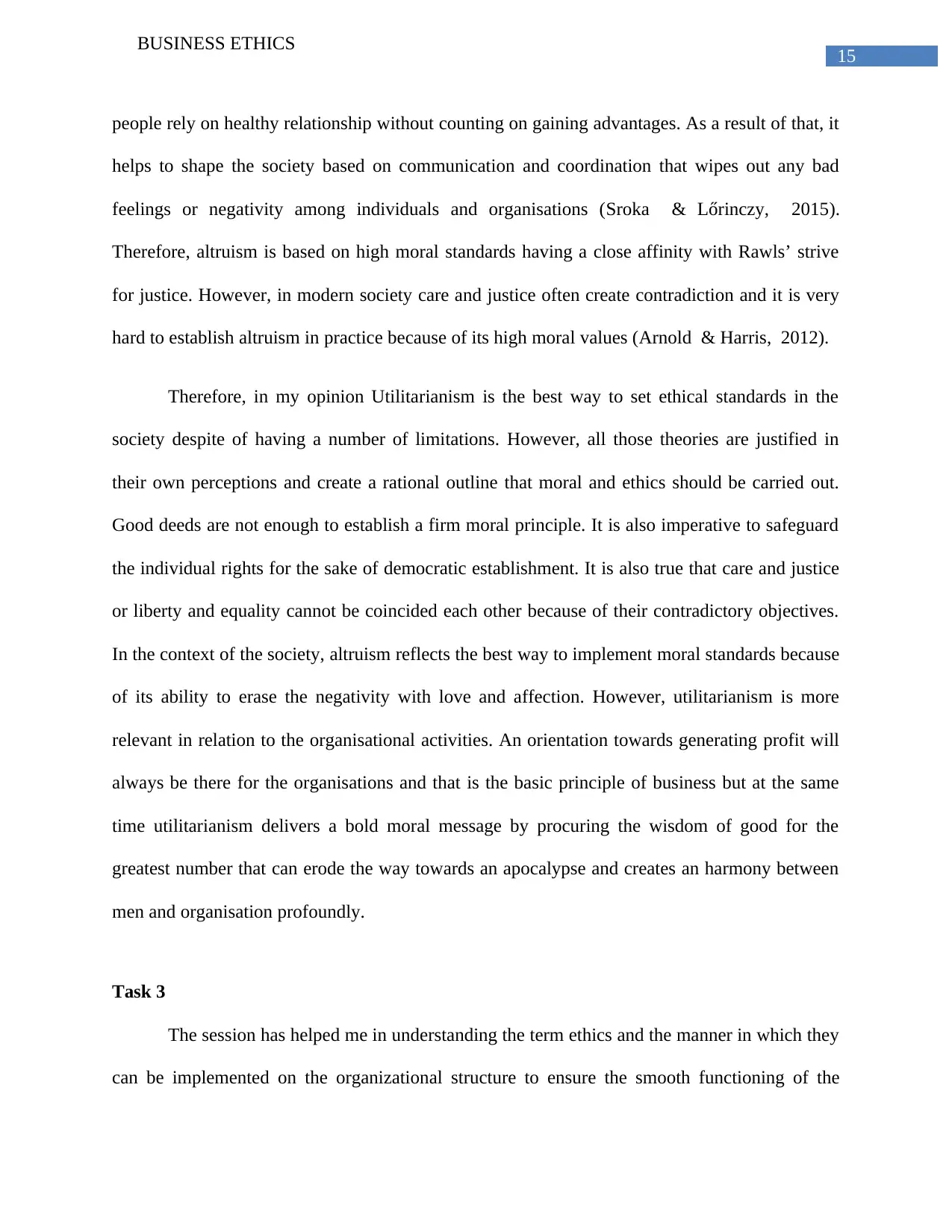
15
BUSINESS ETHICS
people rely on healthy relationship without counting on gaining advantages. As a result of that, it
helps to shape the society based on communication and coordination that wipes out any bad
feelings or negativity among individuals and organisations (Sroka & Lőrinczy, 2015).
Therefore, altruism is based on high moral standards having a close affinity with Rawls’ strive
for justice. However, in modern society care and justice often create contradiction and it is very
hard to establish altruism in practice because of its high moral values (Arnold & Harris, 2012).
Therefore, in my opinion Utilitarianism is the best way to set ethical standards in the
society despite of having a number of limitations. However, all those theories are justified in
their own perceptions and create a rational outline that moral and ethics should be carried out.
Good deeds are not enough to establish a firm moral principle. It is also imperative to safeguard
the individual rights for the sake of democratic establishment. It is also true that care and justice
or liberty and equality cannot be coincided each other because of their contradictory objectives.
In the context of the society, altruism reflects the best way to implement moral standards because
of its ability to erase the negativity with love and affection. However, utilitarianism is more
relevant in relation to the organisational activities. An orientation towards generating profit will
always be there for the organisations and that is the basic principle of business but at the same
time utilitarianism delivers a bold moral message by procuring the wisdom of good for the
greatest number that can erode the way towards an apocalypse and creates an harmony between
men and organisation profoundly.
Task 3
The session has helped me in understanding the term ethics and the manner in which they
can be implemented on the organizational structure to ensure the smooth functioning of the
BUSINESS ETHICS
people rely on healthy relationship without counting on gaining advantages. As a result of that, it
helps to shape the society based on communication and coordination that wipes out any bad
feelings or negativity among individuals and organisations (Sroka & Lőrinczy, 2015).
Therefore, altruism is based on high moral standards having a close affinity with Rawls’ strive
for justice. However, in modern society care and justice often create contradiction and it is very
hard to establish altruism in practice because of its high moral values (Arnold & Harris, 2012).
Therefore, in my opinion Utilitarianism is the best way to set ethical standards in the
society despite of having a number of limitations. However, all those theories are justified in
their own perceptions and create a rational outline that moral and ethics should be carried out.
Good deeds are not enough to establish a firm moral principle. It is also imperative to safeguard
the individual rights for the sake of democratic establishment. It is also true that care and justice
or liberty and equality cannot be coincided each other because of their contradictory objectives.
In the context of the society, altruism reflects the best way to implement moral standards because
of its ability to erase the negativity with love and affection. However, utilitarianism is more
relevant in relation to the organisational activities. An orientation towards generating profit will
always be there for the organisations and that is the basic principle of business but at the same
time utilitarianism delivers a bold moral message by procuring the wisdom of good for the
greatest number that can erode the way towards an apocalypse and creates an harmony between
men and organisation profoundly.
Task 3
The session has helped me in understanding the term ethics and the manner in which they
can be implemented on the organizational structure to ensure the smooth functioning of the
Secure Best Marks with AI Grader
Need help grading? Try our AI Grader for instant feedback on your assignments.
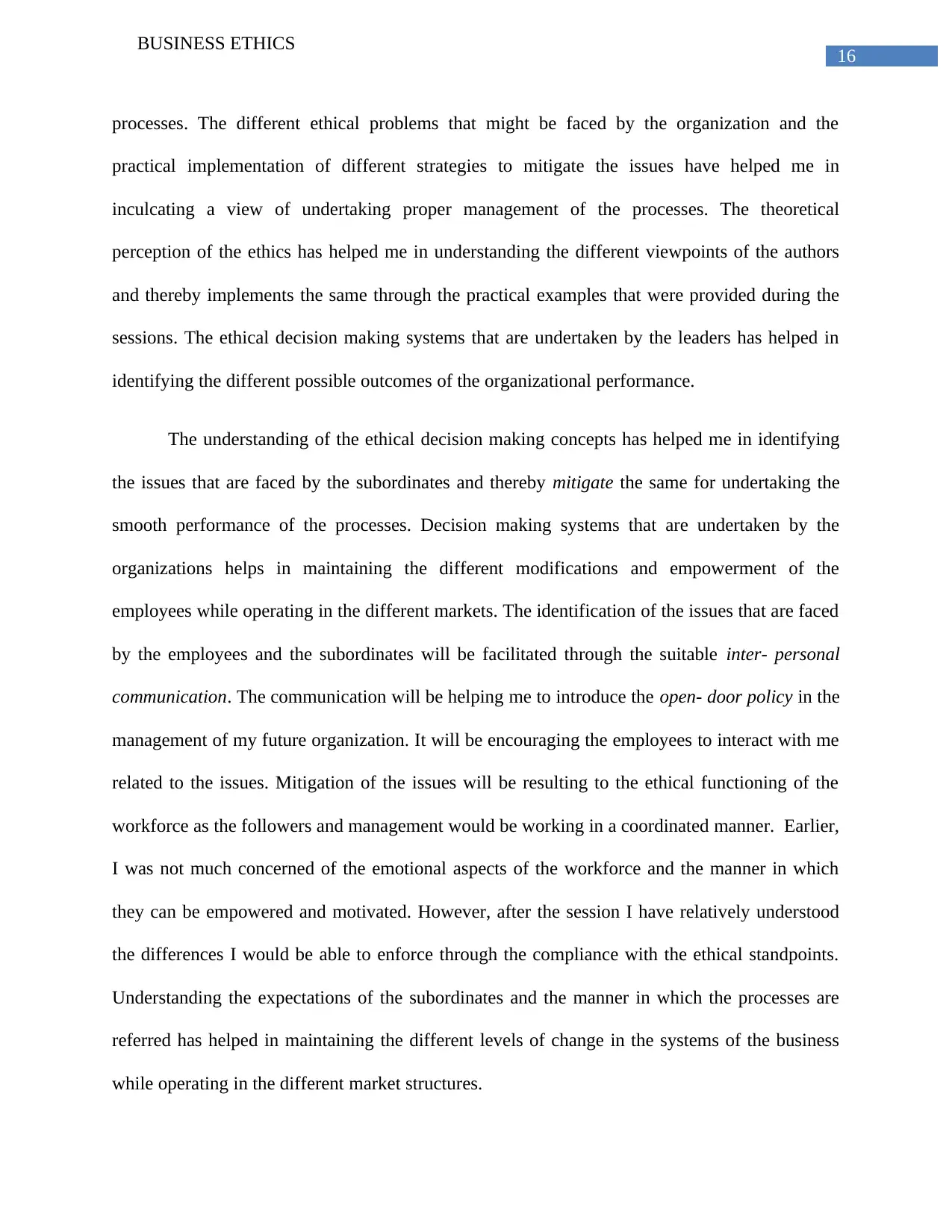
16
BUSINESS ETHICS
processes. The different ethical problems that might be faced by the organization and the
practical implementation of different strategies to mitigate the issues have helped me in
inculcating a view of undertaking proper management of the processes. The theoretical
perception of the ethics has helped me in understanding the different viewpoints of the authors
and thereby implements the same through the practical examples that were provided during the
sessions. The ethical decision making systems that are undertaken by the leaders has helped in
identifying the different possible outcomes of the organizational performance.
The understanding of the ethical decision making concepts has helped me in identifying
the issues that are faced by the subordinates and thereby mitigate the same for undertaking the
smooth performance of the processes. Decision making systems that are undertaken by the
organizations helps in maintaining the different modifications and empowerment of the
employees while operating in the different markets. The identification of the issues that are faced
by the employees and the subordinates will be facilitated through the suitable inter- personal
communication. The communication will be helping me to introduce the open- door policy in the
management of my future organization. It will be encouraging the employees to interact with me
related to the issues. Mitigation of the issues will be resulting to the ethical functioning of the
workforce as the followers and management would be working in a coordinated manner. Earlier,
I was not much concerned of the emotional aspects of the workforce and the manner in which
they can be empowered and motivated. However, after the session I have relatively understood
the differences I would be able to enforce through the compliance with the ethical standpoints.
Understanding the expectations of the subordinates and the manner in which the processes are
referred has helped in maintaining the different levels of change in the systems of the business
while operating in the different market structures.
BUSINESS ETHICS
processes. The different ethical problems that might be faced by the organization and the
practical implementation of different strategies to mitigate the issues have helped me in
inculcating a view of undertaking proper management of the processes. The theoretical
perception of the ethics has helped me in understanding the different viewpoints of the authors
and thereby implements the same through the practical examples that were provided during the
sessions. The ethical decision making systems that are undertaken by the leaders has helped in
identifying the different possible outcomes of the organizational performance.
The understanding of the ethical decision making concepts has helped me in identifying
the issues that are faced by the subordinates and thereby mitigate the same for undertaking the
smooth performance of the processes. Decision making systems that are undertaken by the
organizations helps in maintaining the different modifications and empowerment of the
employees while operating in the different markets. The identification of the issues that are faced
by the employees and the subordinates will be facilitated through the suitable inter- personal
communication. The communication will be helping me to introduce the open- door policy in the
management of my future organization. It will be encouraging the employees to interact with me
related to the issues. Mitigation of the issues will be resulting to the ethical functioning of the
workforce as the followers and management would be working in a coordinated manner. Earlier,
I was not much concerned of the emotional aspects of the workforce and the manner in which
they can be empowered and motivated. However, after the session I have relatively understood
the differences I would be able to enforce through the compliance with the ethical standpoints.
Understanding the expectations of the subordinates and the manner in which the processes are
referred has helped in maintaining the different levels of change in the systems of the business
while operating in the different market structures.
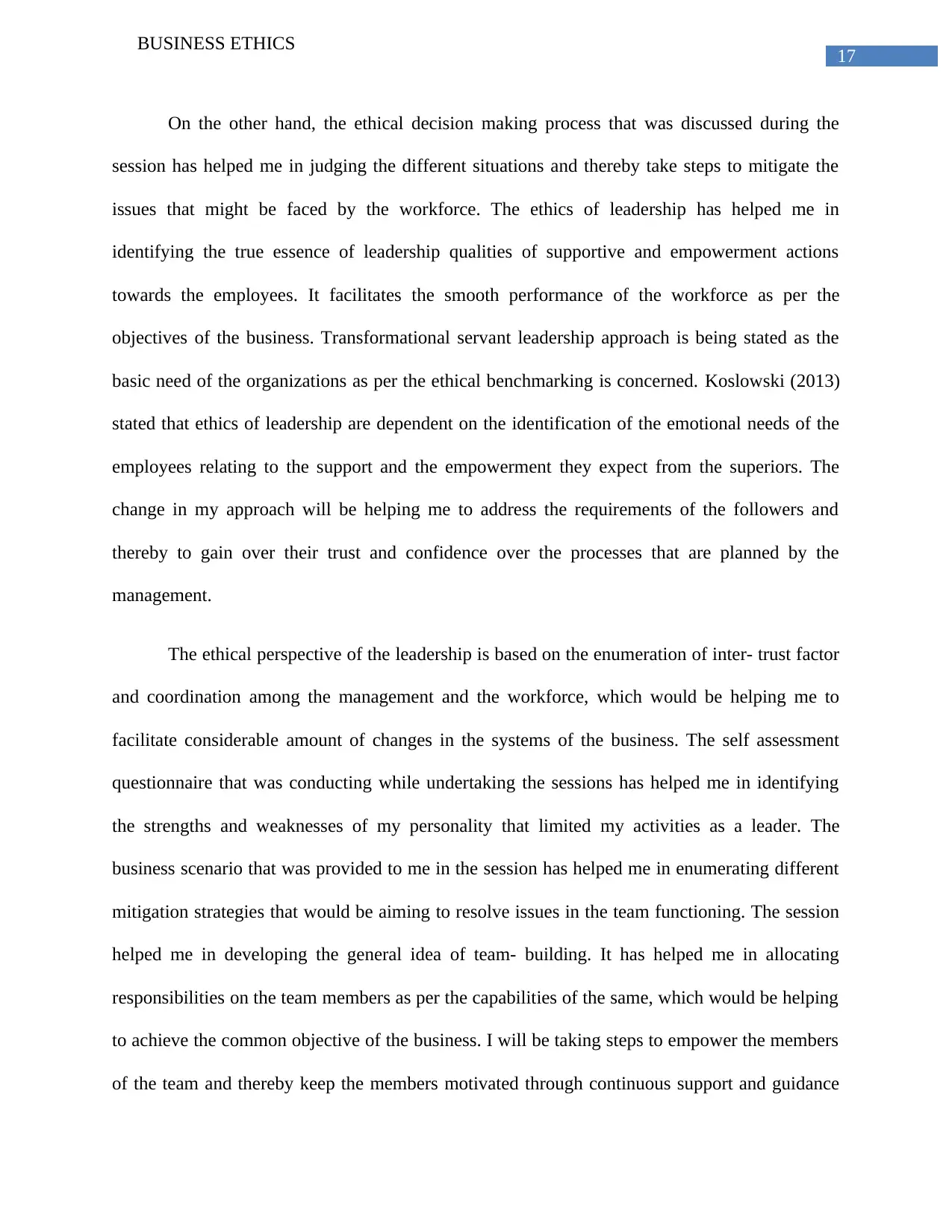
17
BUSINESS ETHICS
On the other hand, the ethical decision making process that was discussed during the
session has helped me in judging the different situations and thereby take steps to mitigate the
issues that might be faced by the workforce. The ethics of leadership has helped me in
identifying the true essence of leadership qualities of supportive and empowerment actions
towards the employees. It facilitates the smooth performance of the workforce as per the
objectives of the business. Transformational servant leadership approach is being stated as the
basic need of the organizations as per the ethical benchmarking is concerned. Koslowski (2013)
stated that ethics of leadership are dependent on the identification of the emotional needs of the
employees relating to the support and the empowerment they expect from the superiors. The
change in my approach will be helping me to address the requirements of the followers and
thereby to gain over their trust and confidence over the processes that are planned by the
management.
The ethical perspective of the leadership is based on the enumeration of inter- trust factor
and coordination among the management and the workforce, which would be helping me to
facilitate considerable amount of changes in the systems of the business. The self assessment
questionnaire that was conducting while undertaking the sessions has helped me in identifying
the strengths and weaknesses of my personality that limited my activities as a leader. The
business scenario that was provided to me in the session has helped me in enumerating different
mitigation strategies that would be aiming to resolve issues in the team functioning. The session
helped me in developing the general idea of team- building. It has helped me in allocating
responsibilities on the team members as per the capabilities of the same, which would be helping
to achieve the common objective of the business. I will be taking steps to empower the members
of the team and thereby keep the members motivated through continuous support and guidance
BUSINESS ETHICS
On the other hand, the ethical decision making process that was discussed during the
session has helped me in judging the different situations and thereby take steps to mitigate the
issues that might be faced by the workforce. The ethics of leadership has helped me in
identifying the true essence of leadership qualities of supportive and empowerment actions
towards the employees. It facilitates the smooth performance of the workforce as per the
objectives of the business. Transformational servant leadership approach is being stated as the
basic need of the organizations as per the ethical benchmarking is concerned. Koslowski (2013)
stated that ethics of leadership are dependent on the identification of the emotional needs of the
employees relating to the support and the empowerment they expect from the superiors. The
change in my approach will be helping me to address the requirements of the followers and
thereby to gain over their trust and confidence over the processes that are planned by the
management.
The ethical perspective of the leadership is based on the enumeration of inter- trust factor
and coordination among the management and the workforce, which would be helping me to
facilitate considerable amount of changes in the systems of the business. The self assessment
questionnaire that was conducting while undertaking the sessions has helped me in identifying
the strengths and weaknesses of my personality that limited my activities as a leader. The
business scenario that was provided to me in the session has helped me in enumerating different
mitigation strategies that would be aiming to resolve issues in the team functioning. The session
helped me in developing the general idea of team- building. It has helped me in allocating
responsibilities on the team members as per the capabilities of the same, which would be helping
to achieve the common objective of the business. I will be taking steps to empower the members
of the team and thereby keep the members motivated through continuous support and guidance
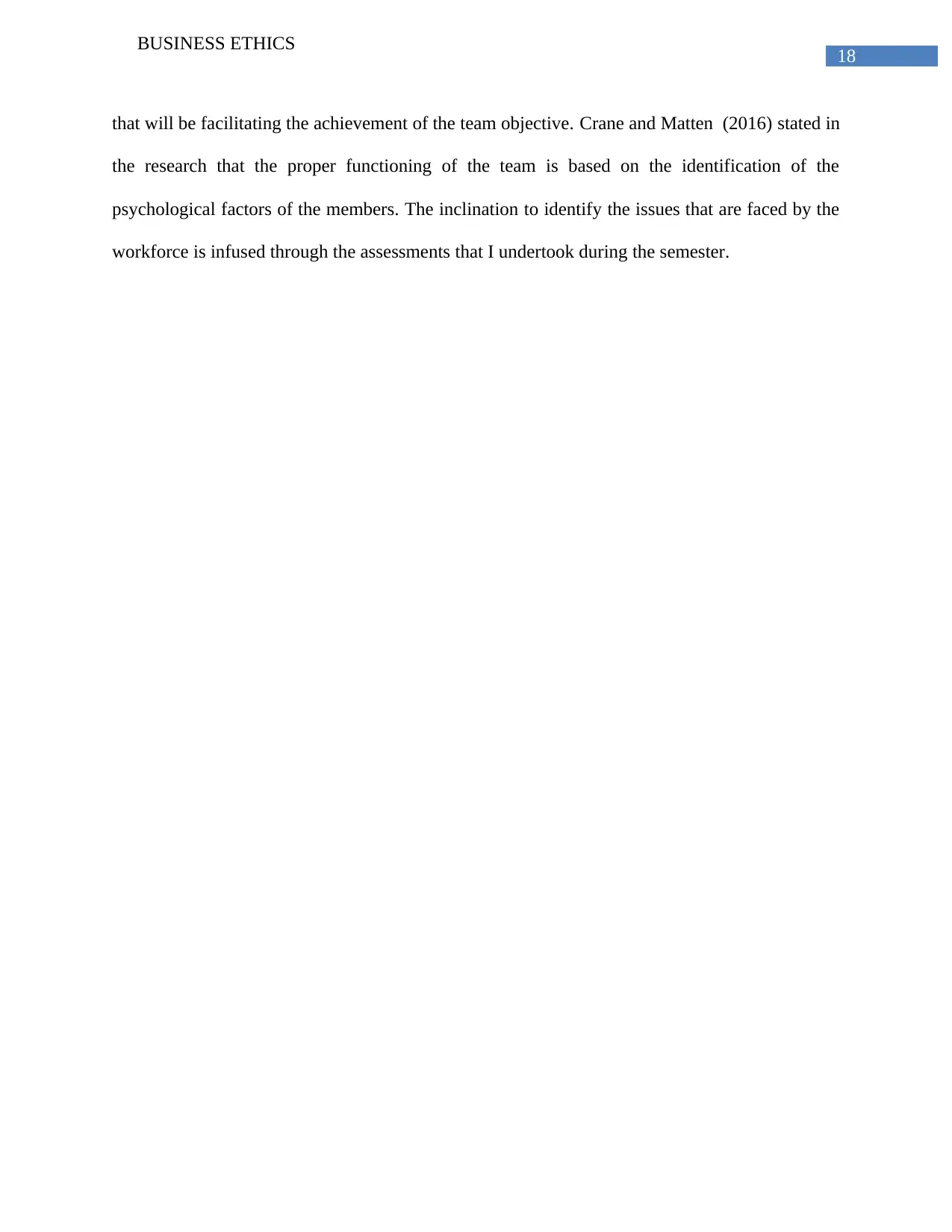
18
BUSINESS ETHICS
that will be facilitating the achievement of the team objective. Crane and Matten (2016) stated in
the research that the proper functioning of the team is based on the identification of the
psychological factors of the members. The inclination to identify the issues that are faced by the
workforce is infused through the assessments that I undertook during the semester.
BUSINESS ETHICS
that will be facilitating the achievement of the team objective. Crane and Matten (2016) stated in
the research that the proper functioning of the team is based on the identification of the
psychological factors of the members. The inclination to identify the issues that are faced by the
workforce is infused through the assessments that I undertook during the semester.
Paraphrase This Document
Need a fresh take? Get an instant paraphrase of this document with our AI Paraphraser
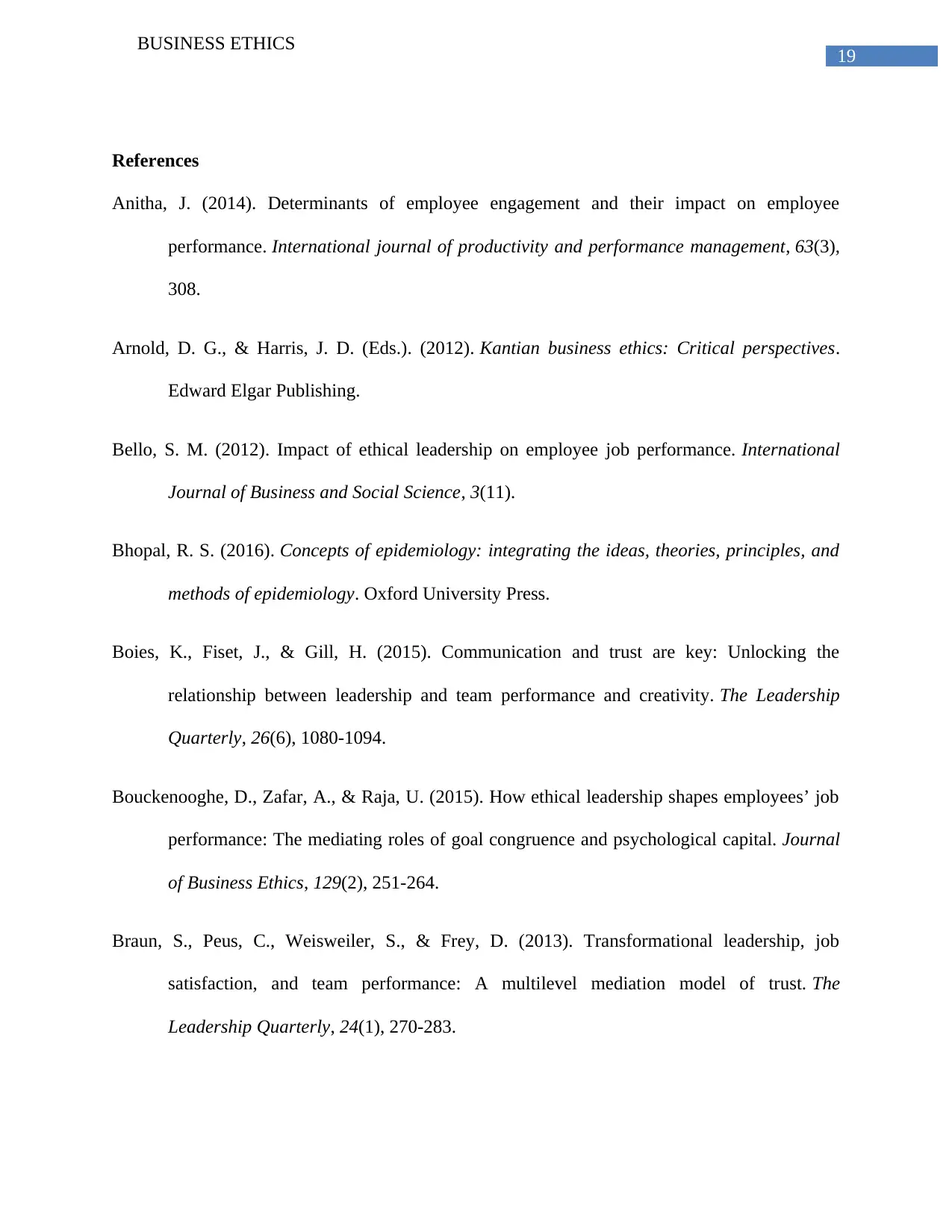
19
BUSINESS ETHICS
References
Anitha, J. (2014). Determinants of employee engagement and their impact on employee
performance. International journal of productivity and performance management, 63(3),
308.
Arnold, D. G., & Harris, J. D. (Eds.). (2012). Kantian business ethics: Critical perspectives.
Edward Elgar Publishing.
Bello, S. M. (2012). Impact of ethical leadership on employee job performance. International
Journal of Business and Social Science, 3(11).
Bhopal, R. S. (2016). Concepts of epidemiology: integrating the ideas, theories, principles, and
methods of epidemiology. Oxford University Press.
Boies, K., Fiset, J., & Gill, H. (2015). Communication and trust are key: Unlocking the
relationship between leadership and team performance and creativity. The Leadership
Quarterly, 26(6), 1080-1094.
Bouckenooghe, D., Zafar, A., & Raja, U. (2015). How ethical leadership shapes employees’ job
performance: The mediating roles of goal congruence and psychological capital. Journal
of Business Ethics, 129(2), 251-264.
Braun, S., Peus, C., Weisweiler, S., & Frey, D. (2013). Transformational leadership, job
satisfaction, and team performance: A multilevel mediation model of trust. The
Leadership Quarterly, 24(1), 270-283.
BUSINESS ETHICS
References
Anitha, J. (2014). Determinants of employee engagement and their impact on employee
performance. International journal of productivity and performance management, 63(3),
308.
Arnold, D. G., & Harris, J. D. (Eds.). (2012). Kantian business ethics: Critical perspectives.
Edward Elgar Publishing.
Bello, S. M. (2012). Impact of ethical leadership on employee job performance. International
Journal of Business and Social Science, 3(11).
Bhopal, R. S. (2016). Concepts of epidemiology: integrating the ideas, theories, principles, and
methods of epidemiology. Oxford University Press.
Boies, K., Fiset, J., & Gill, H. (2015). Communication and trust are key: Unlocking the
relationship between leadership and team performance and creativity. The Leadership
Quarterly, 26(6), 1080-1094.
Bouckenooghe, D., Zafar, A., & Raja, U. (2015). How ethical leadership shapes employees’ job
performance: The mediating roles of goal congruence and psychological capital. Journal
of Business Ethics, 129(2), 251-264.
Braun, S., Peus, C., Weisweiler, S., & Frey, D. (2013). Transformational leadership, job
satisfaction, and team performance: A multilevel mediation model of trust. The
Leadership Quarterly, 24(1), 270-283.
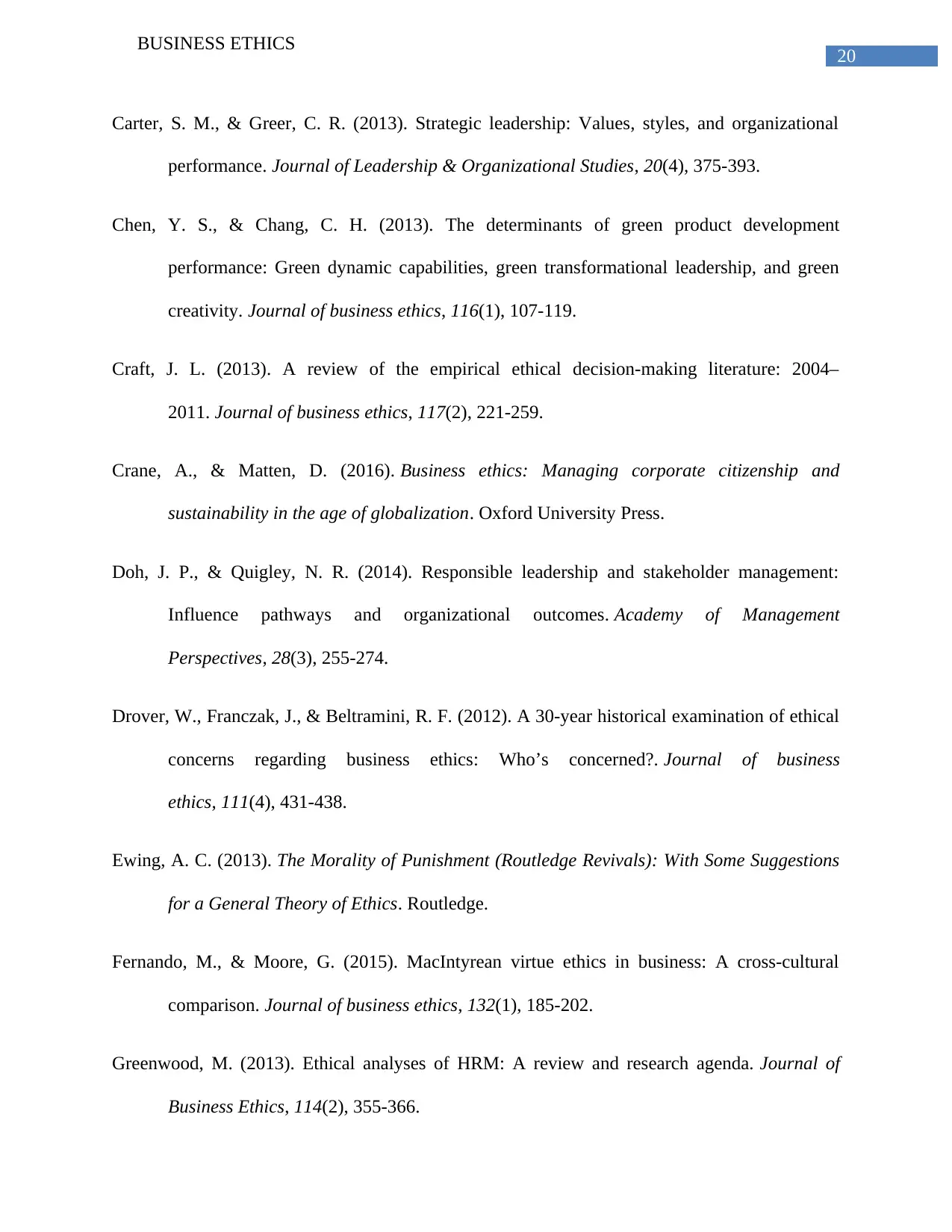
20
BUSINESS ETHICS
Carter, S. M., & Greer, C. R. (2013). Strategic leadership: Values, styles, and organizational
performance. Journal of Leadership & Organizational Studies, 20(4), 375-393.
Chen, Y. S., & Chang, C. H. (2013). The determinants of green product development
performance: Green dynamic capabilities, green transformational leadership, and green
creativity. Journal of business ethics, 116(1), 107-119.
Craft, J. L. (2013). A review of the empirical ethical decision-making literature: 2004–
2011. Journal of business ethics, 117(2), 221-259.
Crane, A., & Matten, D. (2016). Business ethics: Managing corporate citizenship and
sustainability in the age of globalization. Oxford University Press.
Doh, J. P., & Quigley, N. R. (2014). Responsible leadership and stakeholder management:
Influence pathways and organizational outcomes. Academy of Management
Perspectives, 28(3), 255-274.
Drover, W., Franczak, J., & Beltramini, R. F. (2012). A 30-year historical examination of ethical
concerns regarding business ethics: Who’s concerned?. Journal of business
ethics, 111(4), 431-438.
Ewing, A. C. (2013). The Morality of Punishment (Routledge Revivals): With Some Suggestions
for a General Theory of Ethics. Routledge.
Fernando, M., & Moore, G. (2015). MacIntyrean virtue ethics in business: A cross-cultural
comparison. Journal of business ethics, 132(1), 185-202.
Greenwood, M. (2013). Ethical analyses of HRM: A review and research agenda. Journal of
Business Ethics, 114(2), 355-366.
BUSINESS ETHICS
Carter, S. M., & Greer, C. R. (2013). Strategic leadership: Values, styles, and organizational
performance. Journal of Leadership & Organizational Studies, 20(4), 375-393.
Chen, Y. S., & Chang, C. H. (2013). The determinants of green product development
performance: Green dynamic capabilities, green transformational leadership, and green
creativity. Journal of business ethics, 116(1), 107-119.
Craft, J. L. (2013). A review of the empirical ethical decision-making literature: 2004–
2011. Journal of business ethics, 117(2), 221-259.
Crane, A., & Matten, D. (2016). Business ethics: Managing corporate citizenship and
sustainability in the age of globalization. Oxford University Press.
Doh, J. P., & Quigley, N. R. (2014). Responsible leadership and stakeholder management:
Influence pathways and organizational outcomes. Academy of Management
Perspectives, 28(3), 255-274.
Drover, W., Franczak, J., & Beltramini, R. F. (2012). A 30-year historical examination of ethical
concerns regarding business ethics: Who’s concerned?. Journal of business
ethics, 111(4), 431-438.
Ewing, A. C. (2013). The Morality of Punishment (Routledge Revivals): With Some Suggestions
for a General Theory of Ethics. Routledge.
Fernando, M., & Moore, G. (2015). MacIntyrean virtue ethics in business: A cross-cultural
comparison. Journal of business ethics, 132(1), 185-202.
Greenwood, M. (2013). Ethical analyses of HRM: A review and research agenda. Journal of
Business Ethics, 114(2), 355-366.
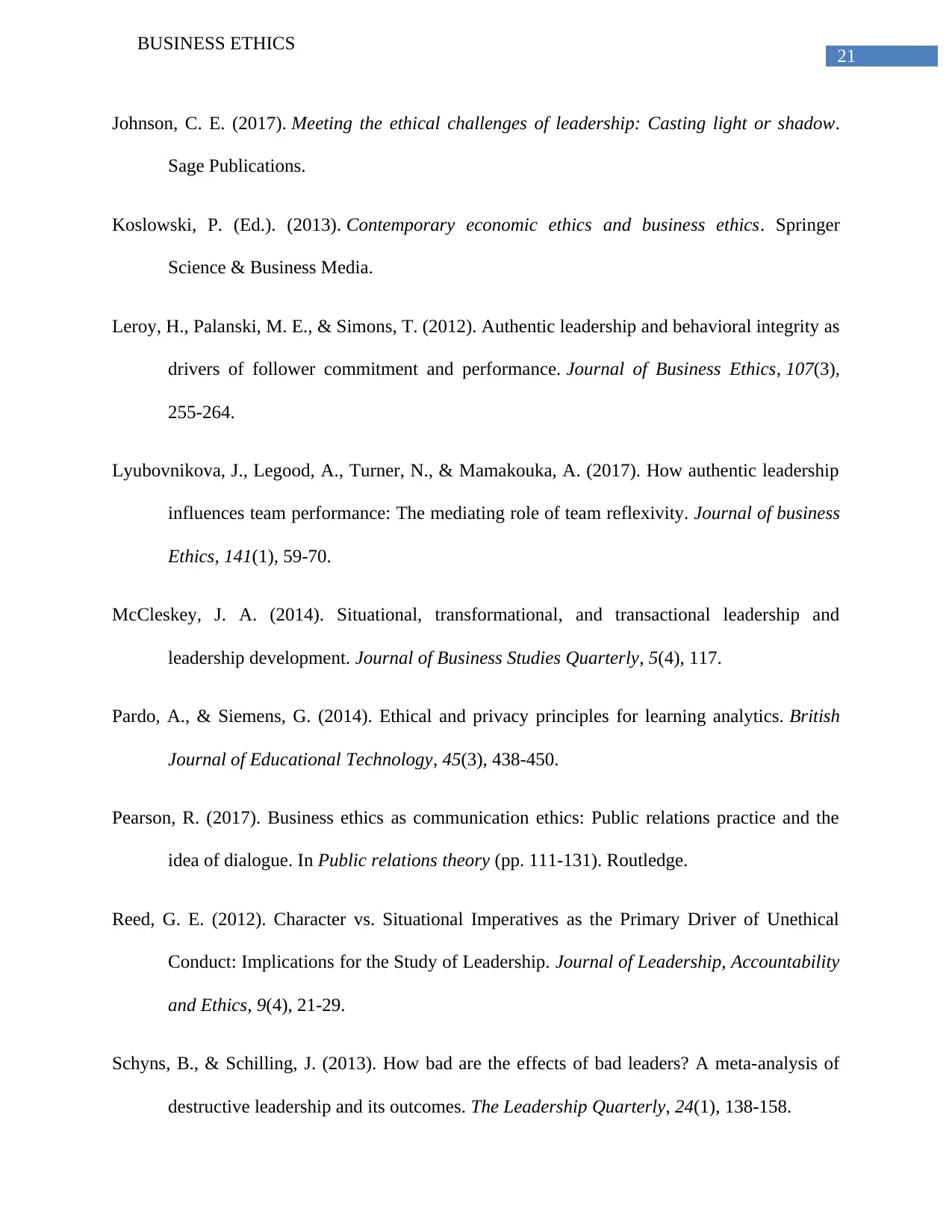
21
BUSINESS ETHICS
Johnson, C. E. (2017). Meeting the ethical challenges of leadership: Casting light or shadow.
Sage Publications.
Koslowski, P. (Ed.). (2013). Contemporary economic ethics and business ethics. Springer
Science & Business Media.
Leroy, H., Palanski, M. E., & Simons, T. (2012). Authentic leadership and behavioral integrity as
drivers of follower commitment and performance. Journal of Business Ethics, 107(3),
255-264.
Lyubovnikova, J., Legood, A., Turner, N., & Mamakouka, A. (2017). How authentic leadership
influences team performance: The mediating role of team reflexivity. Journal of business
Ethics, 141(1), 59-70.
McCleskey, J. A. (2014). Situational, transformational, and transactional leadership and
leadership development. Journal of Business Studies Quarterly, 5(4), 117.
Pardo, A., & Siemens, G. (2014). Ethical and privacy principles for learning analytics. British
Journal of Educational Technology, 45(3), 438-450.
Pearson, R. (2017). Business ethics as communication ethics: Public relations practice and the
idea of dialogue. In Public relations theory (pp. 111-131). Routledge.
Reed, G. E. (2012). Character vs. Situational Imperatives as the Primary Driver of Unethical
Conduct: Implications for the Study of Leadership. Journal of Leadership, Accountability
and Ethics, 9(4), 21-29.
Schyns, B., & Schilling, J. (2013). How bad are the effects of bad leaders? A meta-analysis of
destructive leadership and its outcomes. The Leadership Quarterly, 24(1), 138-158.
BUSINESS ETHICS
Johnson, C. E. (2017). Meeting the ethical challenges of leadership: Casting light or shadow.
Sage Publications.
Koslowski, P. (Ed.). (2013). Contemporary economic ethics and business ethics. Springer
Science & Business Media.
Leroy, H., Palanski, M. E., & Simons, T. (2012). Authentic leadership and behavioral integrity as
drivers of follower commitment and performance. Journal of Business Ethics, 107(3),
255-264.
Lyubovnikova, J., Legood, A., Turner, N., & Mamakouka, A. (2017). How authentic leadership
influences team performance: The mediating role of team reflexivity. Journal of business
Ethics, 141(1), 59-70.
McCleskey, J. A. (2014). Situational, transformational, and transactional leadership and
leadership development. Journal of Business Studies Quarterly, 5(4), 117.
Pardo, A., & Siemens, G. (2014). Ethical and privacy principles for learning analytics. British
Journal of Educational Technology, 45(3), 438-450.
Pearson, R. (2017). Business ethics as communication ethics: Public relations practice and the
idea of dialogue. In Public relations theory (pp. 111-131). Routledge.
Reed, G. E. (2012). Character vs. Situational Imperatives as the Primary Driver of Unethical
Conduct: Implications for the Study of Leadership. Journal of Leadership, Accountability
and Ethics, 9(4), 21-29.
Schyns, B., & Schilling, J. (2013). How bad are the effects of bad leaders? A meta-analysis of
destructive leadership and its outcomes. The Leadership Quarterly, 24(1), 138-158.
Secure Best Marks with AI Grader
Need help grading? Try our AI Grader for instant feedback on your assignments.
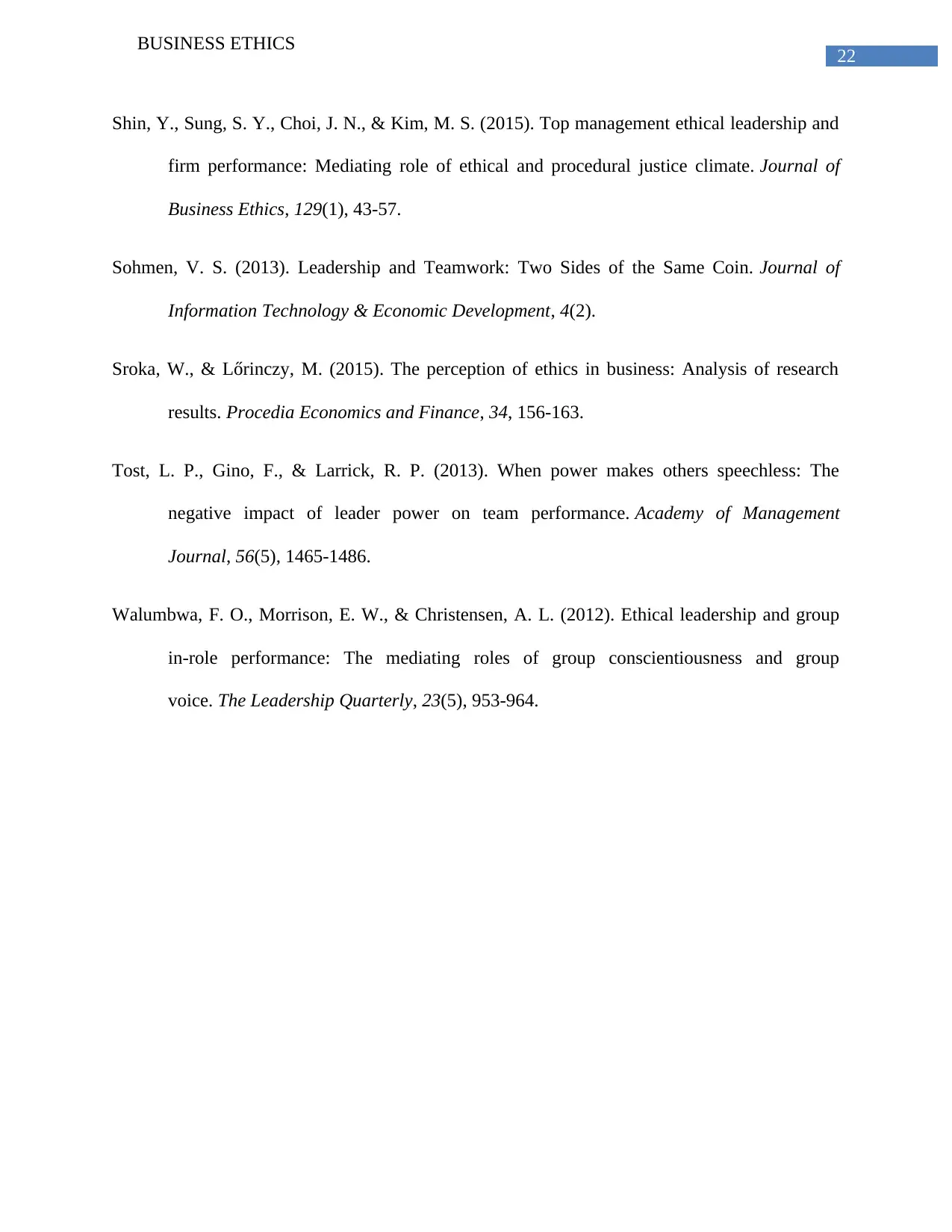
22
BUSINESS ETHICS
Shin, Y., Sung, S. Y., Choi, J. N., & Kim, M. S. (2015). Top management ethical leadership and
firm performance: Mediating role of ethical and procedural justice climate. Journal of
Business Ethics, 129(1), 43-57.
Sohmen, V. S. (2013). Leadership and Teamwork: Two Sides of the Same Coin. Journal of
Information Technology & Economic Development, 4(2).
Sroka, W., & Lőrinczy, M. (2015). The perception of ethics in business: Analysis of research
results. Procedia Economics and Finance, 34, 156-163.
Tost, L. P., Gino, F., & Larrick, R. P. (2013). When power makes others speechless: The
negative impact of leader power on team performance. Academy of Management
Journal, 56(5), 1465-1486.
Walumbwa, F. O., Morrison, E. W., & Christensen, A. L. (2012). Ethical leadership and group
in-role performance: The mediating roles of group conscientiousness and group
voice. The Leadership Quarterly, 23(5), 953-964.
BUSINESS ETHICS
Shin, Y., Sung, S. Y., Choi, J. N., & Kim, M. S. (2015). Top management ethical leadership and
firm performance: Mediating role of ethical and procedural justice climate. Journal of
Business Ethics, 129(1), 43-57.
Sohmen, V. S. (2013). Leadership and Teamwork: Two Sides of the Same Coin. Journal of
Information Technology & Economic Development, 4(2).
Sroka, W., & Lőrinczy, M. (2015). The perception of ethics in business: Analysis of research
results. Procedia Economics and Finance, 34, 156-163.
Tost, L. P., Gino, F., & Larrick, R. P. (2013). When power makes others speechless: The
negative impact of leader power on team performance. Academy of Management
Journal, 56(5), 1465-1486.
Walumbwa, F. O., Morrison, E. W., & Christensen, A. L. (2012). Ethical leadership and group
in-role performance: The mediating roles of group conscientiousness and group
voice. The Leadership Quarterly, 23(5), 953-964.
1 out of 23
Related Documents
Your All-in-One AI-Powered Toolkit for Academic Success.
+13062052269
info@desklib.com
Available 24*7 on WhatsApp / Email
![[object Object]](/_next/static/media/star-bottom.7253800d.svg)
Unlock your academic potential
© 2024 | Zucol Services PVT LTD | All rights reserved.





